#i just think the parallel is interesting especially between two separate games
Explore tagged Tumblr posts
Text
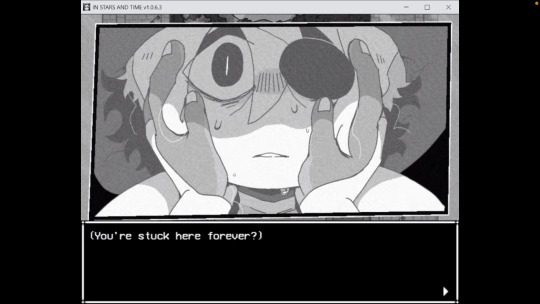

i need to sleep desperately but the parallel here is kind of interesting
#isat#sasasaap#is that the correct abbreviation?#isat siffrin#isat loop#i just think the parallel is interesting especially between two separate games
621 notes
·
View notes
Text
A part of the response to Duskbloods is interesting. Like not even the manner of exclusives—a completely valid gripe—but just how much vitriol held for multi-player games as a concept. It's fine to be disappointed or think that it's not for you, but the way people talk about multi-player as a concept makes it seem like their own perception of multi-player as a platform is exclusively for sweaty tryhards who will send death threats and call you slurs. Constantly fighting against MMR and being branded as a "Guy who's shit" from your lack of skill.
While it's certainly not identical to single player games, it's also not nearly a big of a deal as many make it out to be. Especially for less competitive games. Maybe it's cause my big two main games atm is Warframe and Monster Hunter, but the vibes of both are less actively clashing with others and more working on your own thing in the same room. You and the others have your own goals, but periodically, you'll meet someone else going on their own journey. It's less group project and more sharing public transport. Everyone drops in and out at their own pace but you don't really need to fret about what the others think of you for being there. Or, at least, you shouldn't fret about what others think. There will be assholes on the bus on occasion, but there will also be little moments of serendipity. Charming encounters that will stick with you.
I use both Warframe and Monster Hunter as an example because while they both are exclusively cooperative games, my perception of them is less "Multiplayer" and more "Singleplayer with others." Parallel play, to use more fancy terms.
While Duskbloods certainly is a departure from the other for having an emphasis on PvPvE, distinct from my other examples—as information has been coming out about it, it sounds like "PvP" aspect is... not overblown, but oversimplified. Miyazaki himself mentioned not being a multiplayer guy but wanting to explore things you can't get out of singleplayer. Specifically the briefly mentioned "role" system. Because by the sound of it it's less "competitive" and more "uncooperative."
Unlike similar "Free for all games," players don't share the same goals. You don't go in expecting to kill everyone, but instead are given a task that intersect with other players and their own objectives. Sometimes it involves opposition like having a mark or killing everyone, but other times, it seems that your objective is supportive or even completely detached from the other players. Maybe you have to protect someone, maybe you just need to get in, find a certain non-player enemy, or maybe something irrelevant to life and death entirely. From the sound of it, the game's core concept is finding a way to produce drama and politics and complex webs of relationships between players.
Person A needs to kill person B, but they're being watched over by person C, and person B doesn't need to kill person A back because instead they're needing to track down this boss. Same with person D, but killing B isn't critical and they can even cooperate, but, there's a separate Person E who needs to kill at least 3 others—doesn't matter who, which might lead to them helping Person B fend off A or help A track down B. That's not even mentioning Persons F through H, who may have their own issues. In a sense, it's applying the core of Social Deduction like Mafia or Among Us to more action based games and trying to produce emergent drama and dynamics to tell a story not through writing but gameplay.
And frankly. That's far more interesting than "Battle Royale Soulslike." Its trying to make roleplay truly multiplayer sans-NPCs. It also sounds like the core loop is more Hades-esque where progression isn't locked behind success but instead any outcome leads to developing situations, and you might be able to have some say in what tasks will be given to you.
Even if none of this sounds the slightest bit interesting to, that's fair, but I do think it's a bit reductive to chalk things up to trend chasing or being the new Fortnite. Not even mentioning that if you really want to you probably could trick yourself into believe they're really advanced NPCs.
#from software#the duskbloods#duskbloods#fromsoftware#fromsoft#soulsborne#bloodborne#nintendo direct#nintendo#not to reveal whar Ive seen on my own time but my closest comparison i have to this is the MCYT series Secret Life#which basically put a bunch of people in close proximity to one another and they all have 2 hours to complete certain tasks#of increasing difficulty. and everyone having disparate tasks running parallel leads to odd situations occuring#like one example is two people need to work together to get two enemies to fight and a third one needs to be a bumbling assistant#just an interlocking web of bullshit that ultimately creates a situation far more complicate than any given one in isolation
17 notes
·
View notes
Text
So earlier I made a post about sun/moon from fnaf getting reincarnated as jc, when I was torn between him and wwx. I really couldn't quite finalise it as jc, wwx just had too much potential.
But then I thought, well, why not both? Sun and moon are technically two people! Just give them different bodies!
And obviously you think hyper overworked sun = wwx and quiet angry moon = jc, but... I actually think it might be better the other way around? I'm not sure
Because we don't really see enough of moon to get a clear read on his character? He's corrupt now, we know that, scaring the kids, but there's proof of him previously being very good at putting hyper kids down for nap time, on top of his role as the guard dog of the complex during the hourly recharge when the lights go out. So clearly he's actually capable of being soothing and gentle and caring, as well as probably very protective. By the game, though, he's just a malicious hunter kidnapping kids for the rabbit boss. A bit of a mischievous streak, he certainly likes to make you sweat.
There's a great parallel obviously between moons corruption and wwx's demonic cultivation, jc constantly being the no fun responsible one sick of everything like sun, but I feel like suns martyring protectiveness is much more like wwx. Sun is a bit of a control freak though, and moon seems much more adaptable.
There's also the twin jades but they're way too stable to be the daycare attendant XD. Maybe jgy and jzx? They're half brothers with the same birthday after all... I don't know... The potential is there but again they're not as manic as the twin prides lol.
Anyway they'd make excellent foils, being in different bodies and able to communicate for the first time. I can see them basically being glued at the hip as soon as they were reunited. The fear of dogs would be interesting because they're theoretically more than old and experienced enough to not have it be so world defining but on the other side they were made lived and died in the pizza plex, they would never have seen real animals before except MAYBE the occasional service dog that wouldn't be allowed in the actual play area anyway. I could see wwx loosening up and getting a bit boisterous as he finally gets to live life on his terms (ish) no matter which he is. Him being trained as the right hand of jc would be really interesting if he was moon, given their original roles. Either way I can see him going dark to protect the wens and the other being beside himself at the thought of being separated again. They'd both have pretty severe trauma regarding losing cores, so I don't know if wwx would actually be able to sacrifice his. That little time would be very interesting... Very canon divergent.
In terms of romance, though... I can't see them being willing to share lol. Maybe if they both dated the same person....? I really don't know, romance is not my scene. I'm making them asexual either way lmao.
Oh but the dynamics would be so good!! Yes, I'm thinking moon wwx, they'd be nigh telepathic twins who live to rile each other up. There'd be the angst of recovering their 'relationship' from ruin, being separate people instead of one... Never being able to return to what they once were and if they even want to... Moons broken trust in sun and suns guilt at the way he handled it but having no other option... Both of them completely disillusioned by authority and the people that should have saved them, especially so in wwx's case when his parents died and left him on the streets again.
Ooh! A scene where people get cursed to gem fusion or something, meant to force bickering couples to work together or something, but the prides just flow together like they were meant to be. Lots of should they/shouldn't they unfuse and the realisation that they're separate people now with separate wants and wishes.
They'd probably have pretty severe separation anxiety that their parents would hate though... Burial mounds time skip would be the WORST.
Wwx, experiencing freedom and sunlight for the first time: BEST SECOND LIFE EVER :D!! I can't believe humans get to live like this!
Jc, now having to do work on PAPER like a neanderthal and unable to get moon to shut up by flicking the light switch, still dealing with simultaneously overbearing and emotionally neglectful handlers/parents: yeah no this is just fantastic.
Or wwx: hey hey hey play with me now we're in separate bodies let's go swimming like humans
Jc, grounded for running off to play with wwx and missing training: >:(
Wwx:... *back flips his way upright and tosses jcs paperwork into the harbour*
Jc: *years of pent up aggression that would have gotten them discontinued if he'd acted on it* *bodily throws them in the lake after it*
They'd be soooooo particular about the arts too XD. Mr sun 'be creative on your own time we are making ART' drop. Ooh jc being able to reconnect with kids on his own terms, not being forced to care for them twelve+ hours a day every day without break. Wwx being able to person again without the corruption.
My headcanon for the DA is that it's one person, just two... Filters? Probably share a memory bank but slightly different ai that grew more separate as the corruption spread, cuz it's something to notice that while moon seemingly had it the worst out of the animatronics, sun... Had zero influence. He was perhaps even less affected than freddy, and infinitely more aware of the situation, though he was powerless to change it.
I'm not sure entirely how it would rewrite the plot, that's something for a different time.
#mdzs#fnaf daycare attendant#Other differences that make the prides a well oiled machine: wwx needs to patrol and explore (moon needing to know the whole complex)#And jc not wanting to leave the pier at all ever (sun being the protection for the kids and never leaving the play area at ALL)#Wwx being a night owl and suffering on day shift while jc gets real sleepy in the dark (for obvious reasons)#Wwx being more casual and chill while jc is super detail orientated (putting kids to sleep vs managing them all awake lmao)#They'd probably tie bells on their wrists. Maybe they'd just love the clarity bells? They'd totally share a room and have windchimes#Lwj: *having a gay crisis*#Wwx and jc: *not at all used to romantic signals* omg he hates us#wei wuxian#jiang cheng#sun and moon fnaf#fnaf security breach#fnaf sb#daycare attendent#fnaf daycare au
5 notes
·
View notes
Note
ludinus and ranni are similar in that they both want to use the moon to kill god out of grief and a need for vengeance. But they’re also cunning and cruel and I’ve seen people reduce them to one dimensional villains who want power for the sake of power.
THIS RESLLYNIS SO... anon your mind is wide open. use the moon to kill god (or is the moon using them 🤔?????)
i ended up having A LOT of thoughts about the parallels between the two and their ideology and their methods and the like, crazy amount of comparisons that can be drawn between Exandria and The Lands Between as post-post-apocalyptic worlds, so. I'm putting those under a read more.
responding to your broader point re: fandom interpretations of them, yeah. a lot of people seem far more comfortable with a villain being motivated by power for power's sake than having legitimate grievances about the way things are or even just like, anything sympathetic at all. bc moral complexity and detatching action from ideology is still very difficult and hard, and even people who claim to be above that kind of shallow reading fall into that pitfall from time to time (which is part of the reason i find a lot of Media Understander posting very unserious and more like a psychic's cold reading than an actual indication of someone's skill in that regard).
okay here's the long part.
the thing is, Ludinus and Ranni both- okay. i'll say it, the thing that discoursers love to treat as equivalent to thinking the vanguard have done nothing wrong and should win - Ludinus Does Have A Point. here, so people can screenshot me out of context-
"Ludinus does have a point." - Hecate Densitywell, 2024
both Exandria and the world of Elden Ring have recorded histories of colonialism and slaughter enacted by and in the name of their gods, against the Primordials and the Giants, the Aeorians and the Great Caravan of the nomadic merchants. The Shattering and the Calamity. Caelid and the Shattered Teeth.
Ludinus is much more interested and motivated by these histories than Ranni, who cares about the larger suffering of the world due to the Greater Will purely as an extension of her ideology. But in both cases it supports their overall argument against their gods, one in favor of free will, of separation from fate and the gods putting a finger - or slamming a hand down - on the scales.
it's a point completely betrayed by the methods Ludinus employs - the same kind of conquest and cruelty and control he rails against when it comes to the gods- but that is a condemnation of the actions and their perpetrator, not the ideas themselves. and while Ranni is shameless regarding the harm, both direct and indirect, that has occurred to achieve her goal, that harm more often has occurred in tandem with the actions of the gods and demigods vs in opposition to them.
they both also have personal, emotional motivations (and while i don't disagree with you, "Ranni killed god and recreated the world entirely bc her parents got divorced" is. so fucking funny when you put it like that.), but this is really true of anything anyone does, and it especially cannot be removed completely from issues concerning oppression, justice, the structure of our very society, etc.
and it's so fascinating in both cases, and in Elden Ring I honestly think Ranni's ending is the closest/most promising as a "good" ending, partially bc of all mentioned above, and bc the scope of the game means that the worst consequences (The Shattering) have already happened and cannot be changed, and there are only so many available endings overall. i do not think the same is true for Ludinus. the Exandrian gods are much more similar to mortals as opposed to say, the Elden Beast, and there's a chance they can be negotiated with or compelled to compromise into a more fair, equal way of using their power for good. and regardless, obviously Ludinus and friends should not be put in charge of fucking anything. not even a local craft store.
idk how to end this post. but damn this is all pretty crazy right
#thank you anon you broke my brain i think?#rlly good. glad i made the villain post i have gotten multiple fascinating responses to it to absorb and explode#crposting#anonymous#ask
3 notes
·
View notes
Text
Comparing the JJK fan's current experience with my experience with Jojolion

From 2020 - 2021, the Jojolion fandom was a pressure cooker: fan theories and coping and criticisms were everywhere. Some were determined to keep the faith, some were proclaiming the story ruined, but we all were held hostage by our need to know how it ended, how everything payed off. Reading JJK weekly now, I feel like we are going through something similar. Spoiler-heavy observations and parallels below the cut.
TL;DR - watching, chapter-by-chapter, as a story you care about makes mistakes (whether perceived or not) near its end is maddening. Read Jojolion.
Disclaimers:
1) I very much love both series, warts and all. 2) Even while reading weekly/monthly, both series have great moments and art. It's never all doom and gloom. 3) These are feelings that are massively exacerbated by watching a story you're very invested in finish in slow motion. Jojolion's last arc works better in hindsight (warts and all), and I'm sure this arc will work much better when it's done -- think about how much hate the Culling Games got while that arc was coming out.
Heavy, HEAVY Jujutsu Kaisen and Jojolion manga Spoilers below:
Reasons fans began to dread the end of both JJK/JJL:
Major character that has been very plot-relevant getting an unsatisfying, abrupt death. You never truly shake the feeling it was intended to be a fake-out death
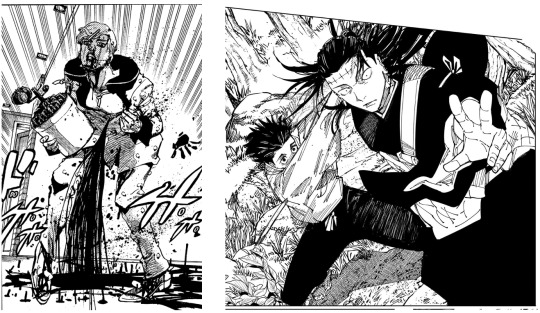
(Literally no one believed Jobin was dead for years) (Gojo can apply here too)
Hyped-up, fan-favorite side characters end up feeling underexplored, getting extremely quick and underwhelming deaths
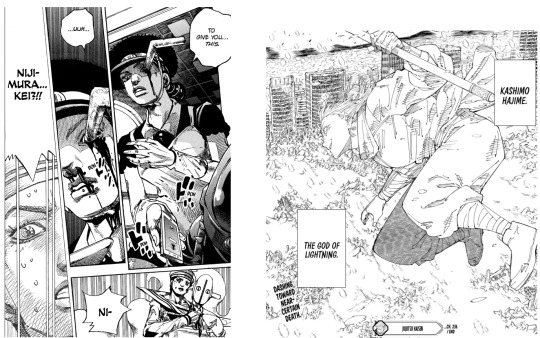
Too much of the finite remaining page time and plot relevance is being given to characters with no real apparent arc or fewer interesting character dynamics
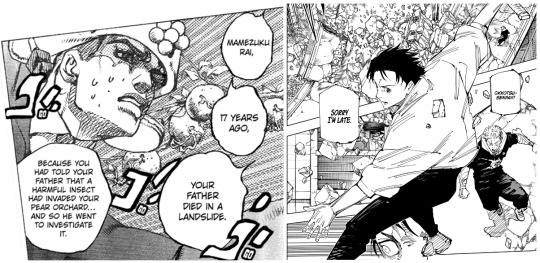
(Love both characters but its true)
Resisting the encroaching fear that long-awaited moments will never come until the story ends abruptly (JJK will most likely end abruptly). "This can't be the last arc, I've been obsessing over this unaddressed plot thread for months!"
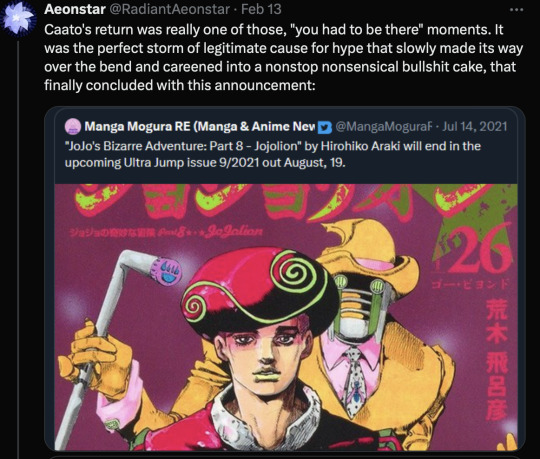
Phases of the battle/arc feel extra long due to wait between chapters, protagonists can feel stuck in one place for months
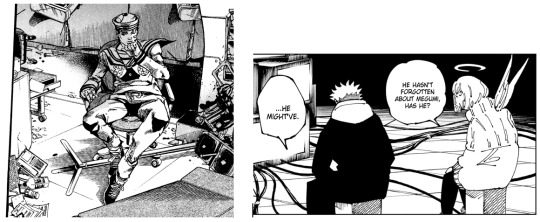
Fan-favorite character dynamics being absent for long stretches of time (YasuGap, Most of JJK's cast lowkey)
The story frequently references its framing device, keeping the faith alive that everything has been meticulously planned

(Don't get me started on the flashforward)
All this, slowly stewing in the fanbase over months, can make fans feel trapped between faith, dread, and pessimism as the story moves at a seemingly glacial pace towards its ending.
I feel like by the time Jojolion was finally ending, everyone's nerves were so fried that we barely even wanted to discuss the ending at all. I hope we can avoid a similar collapse, but we'll see how Gege chooses to end his story. As someone deeply invested JJK's ending, I think it's been important for me to separate from the story for a bit when needed.
Again, keep in mind that I've learned to appreciate Wonder Of U, and I am still enjoying JJK quite a lot. Both series, while very different, never fail to make interesting choices in how they interact with battle manga tropes and structure. They can just be perplexing and frustrating at times, especially so close to the end.
I'm sure this is not a unique phenomena. It's basically what sports fans go through, in a way. These are just two recent examples that really stick out in my personal experience.
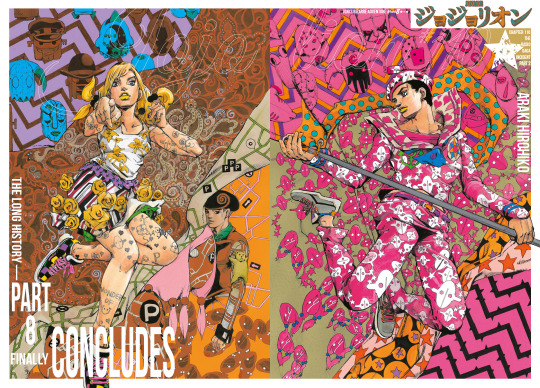
#jjk#jjk manga spoilers#jjk meta#jojolion#jojolion spoilers#wonder of u#literally who is this post for#all my jjk + jjl fans out there!!!#kenjaku is alive I swear
3 notes
·
View notes
Text
some rambling about the game put under a cut because it got a little long, aha.
replaying the original so i can get my picks of what to take from each game as my 'canon' and regardless of opinions on the originals writing / dialogue ( which is very 2000s and certainly regarding ash is inappropriate half the time ) i do think the remake fails when it comes to capturing the comedy of the original. part of the charm is l.eon thinking he's very funny and witty ( he's not ) - it's supposed to be a dumb american action movie that's why all these characters fit the tropes and stereotypes you would expect. i spoke briefly about how whilst i like s.addler in the remake, i think his og counterpart is just more interesting - they feel like two different characters instead of an improved one. characters like r.amón especially lose a lot of their flavour when all the comms scenes are removed. it's the one issue i have with all the remakes - they lack that campy charm by opting for serious 'realism'. l.eon still makes jokes but none of them land because he's so much more serious and whilst his jokes were bad in the og, i think him deflecting / coping with humour is an interesting trait.
i think operation j.avier suffers the worst from it though. they had the chance to add it in-game, even in just a cutscene, to finally give context and backstory and instead they changed it entirely to remove any mention of m.anuela ( even j.avier himself ), the virus ( though i understand many people new to the series due to the remakes won't know what t v.eronica is ), j.ack's infection and dismissal ( him working for s.addler and not w.esker is an odd change, but if they committed to it could have really worked - a disabled, disgruntled, isolated war veteran let down by the government is the perfect target for a cult ) but not to mention that the 'you can't save anyone' / 'this time it has to be different' makes far more sense when you consider m.anuela ( especially as l.eon could have no impact on saving m.arvin and by this point he already knows a.da is alive ) - especially if they canonized the 'bad' ending where she turns to ash ( as we never see / hear from her again, which is fine - personal take that not every one-time character has to return, even if i like them ). the parallel of a young innocent woman, infected, under l.eon's protection, would have worked much better than 'the government killed all these men for...reasons?' ( why were they killed? did s.immons have something to do with it, showing more of his corruption prior to six? were they infected with the virus they don't mention? as the series progresses this happens more and more, and l.eon himself aids in the coverups of rc etc etc, which could have added more context to the issues between him and j.ack but instead it just comes across for people who have are new that j.ack's blaming l.eon for...reasons? ). they could have sown the seeds of future events whilst bringing in the important things that get missed because it's in a railshooter side game and it's a missed opportunity! also i think if they did acknowledge the canon of m.anuela's survival that her and ash could have gotten on really well ) even if it's unlikely they'd meet.
ash definitely 'won' in terms of improvement ( though i never found her annoying, fandom just was outrageously sexist / harsh on her - whilst it's better now, her being relegated to the 'braincell haver' or the 'daughter / sister / niece' of l.eon ( and usually l.uis) when she's an adult woman not that much younger or the rampant over sexualisation of modders which is a plague upon every modding scene is still... not great. god forbid we treat women as more than accessories ) but i do wish they kept in a litte of her sharpness. it's been a long time since i've played the og so i'll have more thoughts but definitely the scene where she runs away / they get separated is a huge improvement. i've seen people say before the og ash was 'bitchy' but her shoving l.eon away always felt like panic - she's frightened! the remake definitely did a better job of showing it ( and the effects of the p.laga in general, although i do think they should have kept in the scene with l.eon and a.da, even if they changed it so he doesn't choke her, to show how it's effecting him too - especially as iirc he isn't given a dominant p.laga like ash is so he should be suffering far less control, although i suppose maybe that is shown in how he's rendered immobile repeatedly whereas she is controlled? who knows ). either way, the relationship between them two of them is vastly improved and though i wish we'd gotten to see more of her interactions with the rest of the cast ( though i do find her 'for l.uis' a nice touch - i'd like to explore their relationship but definitely the revelation that he's partly responsible because whilst l.eon knows, she doesn't ). it would have been nice to get a gauge on her relationship with her father, for her to talk about her experience being kidnapped and growing to trust l.eon ( especially as her security failed to protect her / were in on it and the subsequent distrust it would form in the government ).
tldr; there's a lot of things it improves on but equally as much it fails with ( that's what rp is for! ) but i'm glad after all these years ash has stopped being utterly ignored or despised by the majority of fandom.
0 notes
Text
[thoughts and small analysis on kazuha’s GAA domain, Kazuha’s story quest spoilers warning too]
(has not been proof-read so good luck LMAO)
Ooooh boyyyy his quest was unexpectedly really long. It was really good, however! I would consider it in the S tier hehe
I just want to talk about the design of the domain first because WOW. The domain looking different every time you enter to represent the different times in Kazuha’s life/story. The mechanics were very interesting (despite it giving me vertigo and a headache NSJSJ 😭😭😭). There’s just a lot of care that went into this domain. I was pleasantly surprised when they tossed in that old akira kurosawa film filter and locked the camera. It was a small design choice but it added a lot to the experience.
And regarding the actual story and execution, I really preferred the domain over his story quest. However, now that I look back, I think this was more of a personal preference than how good it was objectively. The two quest serves separate purposes. His story quest was more focused on reconnecting with his clan’s legacy meanwhile not letting this define who he is in the present. Essentially, how will he bring honor to his clan while maintaining his current self and ideals. Meanwhile, the domain is a FAT summary of his story since he was young and all the way to the present. It was more of an introspection dump, a story of healing and reconciliation of the past and the present. There’s no ACTUAL development of his character, but more of a deeper delve into how he developed his emotional maturity and how he accepted his past.
We already know his story (him carrying his family legacy, fleeing Inazuma, becoming a hero essentially overnight, blah blah) so I’m glad they focused on what he felt in the moment and how learned to leave everything behind and move on. It was really moving to listen to his dialogues with his father and him wanting better for his son ;~; it was especially bad when Kazuha was convinced he was a disappointment to his clan PLEASE. I was so shocked to hear him raise his voice like that. Normally, he’s so tranquil and polite. So it clearly weighed his mind a lot. I could’ve cried right there. And the small detail of the seelie representing Tomo…. god. 💀 let me die in peace….. the Alcor being his last destination of the domain is just so beautiful. He really is at home and out here enjoying his life!!!!! 😭
This is more of a side thought I have so feel free to skip but when I played this domain, I just can’t help but think about this game that I played called Ghost of Tsushima. The protagonist of that game (Jin), I thought, was somewhat similar to Kazuha. Very different plot but shared some nice parallel. They both come from prominent clans and had a bright future ahead of them. But they eventually faced obstacles that led them to reassess their identity and learn to let go of the past. Jin is afraid to abandon his samurai ways in fears of losing his father figure while Kazuha was torn between honoring his clan/past and living how he truly wants to. I personally think it’s such a wonderful trope. Watching characters liberate themselves from their past yet still remain so kind-hearted and humble is 👩🏻🍳💋
One of the things that I didn’t like about the domain and moments that lead up to it was that so many things were rehashed. Some of the characters repeated what happened at the inazuma festival and when Raiden Shogun still reigned. It might have been for new players but for me, it just hogged so much time that could’ve been spent for more Kazuha’s monologue or something. I already knew that the domain was gonna repeat aspect of Kazuha’s story but please I don’t wanna hear word for word what happened at the festival again 💀
But this domain just shows that Kazuha is the ultimate comfort character lmao he is so sympathetic and so patient with himself. His emotional maturity is something to be envious of, especially for someone his age. His life was so tumultuous yet he still held his head high and continues to anticipate for the future, not consumed by any extreme emotions. And the latter COULD’VE happened bc he literally lost everyone he loved in his life. He is the epitome of “live in the moment” and “home is where the heart is” signs that you would hang in the washroom LOL
I love that we are starting Inazuma with Kazuha and also ending with him. His story is a counterpart to Raiden’s old desire for eternity. Raiden is about stagnation and absolute stasis. Kazuha is about forgiveness, trauma acceptance and moving on with one’s life. They’re the polar opposites of each other (at least pre-archon quest Raiden anyway). It feels like the opening and closing of a chapter, which we are doing with Sumeru!
Anyways this GAA is already a banger and probably gonna be even better than last years. I’m SO excited for everybody else’s domain. Idk how they’ll do Xinyan bc we know so little of her and HYV always shove her in random events LOL. This was amazing so I can’t wait for more lore dump.
#sen speaks#genshin impact#kaedehara kazuha#2.8 spoilers#golden apple archipelago spoilers#genshin spoilers#LORD KAZUHA IS REALLY ONE OF MY FAVS#anyways gonna go finish Heizou’s hangout now bc i hear his voicelines are 😳
40 notes
·
View notes
Text
NEW PROMO LETS GOOOOOO
youtube
And because I am completely normal about this show, I'll dive in and give my thoughts and predictions for the finale based of this
First off I find it interesting how most of clips seem to be in what will probably be the first half of the finale, we see a shot or two of an impending fight, but we haven't gotten to that point yet. It's understandable that they wouldn't want to show too much beforehand, so I'm glad we're not getting spoiled for the whole plot.
The storyline I'm getting from this is that after the team teleports and Stringbean is revealed, the collector separates Luz from the others (probably turning them into puppets), which makes sense considering they do NOT like Luz. He threatens her or puts her in danger in some way, and then Eda+King end up intervening or are possibly summoned by the collector since they know of their supposed betrayal. We see their reunion in the end bit, but how they end up there is a little unclear.
Then we get to the games bit. It's self explanatory, the collector is very upset, and decides to put the original trio through all sorts of torturous games and challenges as a means to take out his anger and frustration over their belief that King isn't his friend anymore, and that Eda and Luz took that away from them. We go through the games, and after being fed up or being given an idea from Belos-Raine, he decides to trap them in their minds. That's what I think those orbs are.
I personally think that grom could be weaponized here in some way, or maybe it's the state of mind all the puppets experience, being trapped in their own insecurities and fears. Or maybe it's just an illusion idk lmao. Anyways this takes us to the bits with Luz as Belos, as well as Harpy Eda in front of the Conformatorium and King in front of some ornate door (I would use pictures if I could but I'm posting this on my PC and it's six years old and ready to die). Each of these characters will go through mental hurdles and face old memories, insecurities, and fears, just for the chance to "Wake up".
While Eda and King's mindscapes are still unclear, Luz' has been shown quite a bit in this promo so I'll mainly be focusing on that. The obvious first thing to notice here is that Luz is dressed as Belos, most likely reflecting how she feels about having helped him reach the collector (even though that insecurity was mostly resolved in ttt, I doubt she's fully gotten over it yet). Although I could also see it as a form of parallel between the two humans who got lost in the boiling isles with big dreams, or both honesty. When they show the petrified civilians she'll most likely believe that it was all her fault, and fall deeper into the hole of blaming herself for everything. When her friends show up though, part of me wonders what role they will play in her nightmare. Everyone is dressed in different outfits ranging from S1-S2, but there doesn't seem to be any true correlation between them. They could be the manifestations of their voices from the outside trying the encourage Luz to triumph past the spell thing she's under, which would explain why they're turned into puppets (as seen by amity's hand in the first frame).
I don't think any of the other clips related to Luz go past her nightmare sequence, so now let's talk about some random tidbits in this promo that are intriguing.
Belos seems to have left the collector after they began their challenges, and from the clip with Raine it seems like he wants to get back to the heart in his throne room. Some people think that Raine is trying to stop Belos, but I believe Belos is trying to smother them so that they can't fight back. Call me crazy but I feel like he's going to try and possess the whole titan. That scene with Eda and King with a background of goop and blue eyes seems to be their reaction to it. I don't think he'll be successful in his attempt, but man who even knows anymore with this show.
Glyphs are really important, especially in this episode. With the exception of palisman there is almost no usage of staff magic/spell circles in this trailer, it's all glyphs. Which probably means that those capable of producing their own magic naturally will be affected by some event in some way, probably some more collector magic stuff. What I especially like though is how much we see the light glyph emphasized in this trailer, it's the original and also very special to Luz, so seeing it as her "light in the dark" to wake herself up is really cool and I hope we get to see more like that. I'm also really excited to see the hexsquad using glyphs, those fight sequences are going to be sick I can already tell.
The Eda and King transformation part really caught me off guard. I can only assume that after dealing with their mindscapes like Luz, they were able to become better versions of themselves, King especially. I believe their transformation could also tie in in some way to that guy in the in-between we saw at the beginning of ftf. Oh my god I forgor about that guy.
HEAR ME OUT but if Belos is actually trying to possess the entire titan and that guy is the soul/spirit of said titan, could we see an intervene with Luz where she is able to communicate with him and therefore save the isles, this definitely does not make sense rn but I'll cook that a little more I promise.
Questions, little thoughts, and more
-Who will the final battle be between? (Or will there be a final battle at all?)
-I NEED A WITTEBANE BROTHERS FLASHBACK PLEASEEEEEE
-Someone pointed out that there was a flapjack statue/mountain thing in the background of Luz nightmare scene with the hexsquad and I'm not okay
-Since Amity was capable of moving her hand while in puppet form, does that mean it's possible to break the spell?
-Luz is finally getting the spotlight she deserves, I liked that we gave other characters attention in these past two episodes but Luz needs her time to shine for this finale
If you somehow managed to get to the end of this, thank you! These take a little while but I love getting to write my thoughts on this stuff down for people to see
#the owl house#toh#toh season three#toh s3#watching and dreaming#luz noceda#the owl house eda#eda the owl lady#hexsquad#hunter toh#toh willow#toh gus#emperor belos#the collector#thanks to them#for the future#toh king#toh the collector#harpy eda#Youtube
19 notes
·
View notes
Text
Alright, here it is: The meta post about Eddie Diaz and mother figures and how it all leads to Buddie (I think). Thanks to @yramesoruniverse for your help with this, and @kitkatpancakestack and @evanbucklies for inspiring it! I really have been thinking about this nonstop and had to get it all down. This got quite long, so I'll include a cut in order to spare everyone who doesn't want to continue reading!
We first get an idea of Eddie's complicated thoughts surrounding mother figures throughout his whole storyline with Shannon in season 2 when he romantically reconnects with her for Christopher's benefit. I do want to keep the focus here trained on Eddie in season 4, but I want to point out a season 2 line that is pretty fitting. As much as I don't want to use a Shannon quote as a starting point for a meta, I think this one is actually pretty useful: "...Eddie always knows what's best for everyone...God forbid you stop for a second and actually ask them what they need." While it's harsh and spoken out of spite, Shannon does make a point here which becomes relevant at the end of season 4.
We don't know a whole lot about season 4 Eddie (thanks writers) aside from the fact that he's working on being a single father (he tells Marjan in the crossover that he's "doing the whole single dad thing") and being a support system for Buck and the rest of the 118. Eddie's "arc" this season is moving on from Shannon and beginning to date again (a very small and limited arc, which hopefully season 5 will remedy). Of course, because it's Eddie, the core of this arc is him wanting what is best for Christopher. And it seems pretty clear that what Eddie thinks Chris needs is a complete family with a mother figure (note how he asks Bobby if he's "happy now, with Athena and the kids" and just assumes that Bobby is talking about Ana Flores), but the universe pushes against this idea throughout the whole season. There are a lot of examples in season 4 of unreliable mother figures (for example, the alcoholic mother who causes the wreck in Blindsided), but in order to save some space here, I'll list and discuss those in another post. The main thing I want to point out is that we've seen that mother figures aren't always perfect, and they aren't the end all be all that Eddie thinks. And canonically, the show suggests several times throughout the season that the partner that Eddie needs/wants and who is best for Chris is actually Buck.
In Breaking Point, while Eddie is on his date, it's Buck who is at home taking care of Christopher and getting him through his nighttime routine (which establishes that he knows the routine and has gotten Chris ready for bed before, hence the reference to his "cautionary tale"). On the date, when Ana says that no one has been in his life since Shannon passed away, Eddie noticeably looks uncomfortable (the will reveal makes this scene and that particular comment and Eddie's subsequent reaction so rich. Eddie knows that what Ana is saying is completely untrue, because the person he trusts most with his son is with him at that exact moment). Later, when Eddie tells Christopher about his new 'friend', he says "it's a woman." And...to be honest, what the hell was that? He could have said, "I'm dating someone" or "I have a girlfriend." But he says it like this? And it's weird...right? Christopher is the one who has to say "girlfriend." Also his tone of voice when he says it...it's suspicious to me. Anyways...Eddie talks with Ana about Christopher's reaction and her first instinct is to take a break and wait for Christopher to warm up to the idea so as to not cause him more pain. Meanwhile, Chris is out the door, in an Uber, and on his way to Buck, the person who actually gets Chris to talk about his feelings and who fixes the whole mess. So while Eddie is talking with Ana, Buck is playing a parental role AND promising Chris he isn't going anywhere, completely juxtaposing everything Ana has said and done in this episode (throwback to Fools, anyone?). Just like we see in 4x14, the perfect partner that Eddie is looking for is already putting in the work, no questions asked (and this is all before Buck knows about the will!). Yet Eddie is still trying to force it with Ana.
We see this again very briefly in Parenthood. Eddie and Buck are seen agreeing on parenting ideals on a call, similar to how we saw them work together in Future Tense to talk Chris out of playing video games. At the end of the episode however, when Chris asks to join the movie, Ana just jumps ahead and lets him in, not consulting with Eddie. Of course, this isn't a serious issue and Eddie is happy to have Chris join them, but it still carries on with juxtaposing Ana with Buck. It's also a bit interesting that Chris sits between them, parallel to the video game scene from season 3. But again, it's a very brief scene, so I don't know how much value it has overall.
We see all of this come to a head in 4x13 when Eddie becomes invested in the single mother and her son from the balcony call. Interestingly, this call happens after Eddie's conversation with Carla ("make sure you're following your heart"). On the call, Eddie flirts with the mom. This is interesting because we've seen many times in the past that Eddie...doesn't like flirting, especially on the job. Eddie openly flirting with the mom here may be his way of fighting against what his instincts are telling him Carla's comment was about (him liking Buck/a man). Eddie quickly becomes invested in Charlie (the son) and takes a liking to his mother because he relates to her. You can kind of see the gears working in Eddie's head when he's at their apartment...he's admiring her and perhaps maybe fantasizing about having a partner who gets it. And he sees a mother taking care of her son...reinforcing his love for the mother figure. But of course, we all learn by the end of the episode that this mother figure is extremely warped and not at all what her child needs.
The best part about this plot is the way it plays into the shooting scene at the end of the episode. Just before he gets shot, we see Eddie in an interesting framing choice (I am genuinely serious when I say that I want to sit down with Brenna Malloy and ask her about her directing choices for this whole scene):
The mother and son are placed into separate ambulances, and Eddie stands between the two vehicles. Visually, Eddie is literally placed between the mother figure and the son, and Buck is standing in front of him (at a slight distance). As (thank you to @kitkatpancakestack for pointing this out!) the ambulance with the mother drives away, Eddie says "shoulda gotten here sooner" to Buck (who replies, "That kid is just lucky he met you." He knows how to reassure Eddie and recognizes what is good for the child). Then of course, Eddie gets shot. But let's focus instead on why this framing before the shooting is important: the universe does scream, and it sure as hell was screaming at Eddie this whole episode. Carla calls him out for not following his heart, he idolizes this mother only for her to end up being horrid, then he gets shot with his partner standing right in front of him (you know, the same person who takes care of his son for the entirety of the next episode).
This can be read so plainly: Eddie has been fighting hard for what he thinks is best for his son, and he's stuck in this relationship with Ana because he thinks she is what will make Christopher happy. Meanwhile, Buck is in front of him and has been there the entire time putting in the work with Chris and making him feel heard, loved, and important. This ties right back to that Shannon line: if Eddie had simply asked Christopher what he needs/wants, it's very possible that his answer would be "Buck." Eddie doesn't need to be stuck in the middle of this relationship he doesn't care about because Chris' happiness is not dependent on having a mother figure.
Of course, we didn't see very much of Eddie in 4x14 so we don't really know what is going through his head regarding the shooting or Carla's comment just yet, but I'm hoping we see a lot of him working through all of the events that took place in 4x13/14 throughout next season. Because of the way the mother/son storyline ended up and the way they framed Eddie in the shooting scene, I'm willing to bet that he's going to be reevaluating just what Christopher needs and what he already has (with his Buck).
(Also side note--the welcome home party scene...when Buck is watching Eddie greet Christopher, notice the framing there too. The photo of Chris and Shannon is on the right side of the frame, Eddie and Chris in the middle, and Buck to the left. You already know what I'm going to say, so I'll leave it at that...)
Anyways. Edmundo Diaz is confused about what he and Christopher need, and it's actually a brilliant way to dive into a storyline about his sexuality and his feelings for Buck. Remember that post-finale interview with Tim where he said Eddie is always concerned with what's best for Christopher? That there will be a lot to explore with Eddie? I take everything Tim says with a grain of salt, but looking at all of this, there's quite a bit here pointing in the direction of pining Eddie. It's not wishful thinking, it's in the text.
I'm literally just applying basic film analysis to these scenes...and everything is adding up to a larger picture. I'm really excited to see what Eddie's arc in season 5 will be because there's so much set in place for it to be really great.
#buddie#911 fox#eddie diaz#evan buckley#christopher diaz#meta#mother figures#part one?#I have more to say but will save for another post#buddie canon s5 idc
211 notes
·
View notes
Text
Fire Emblem Fates: Personal Arcs and Thematic Parallels for the Royal Siblings
Introduction
As we all know by now, the royal siblings of Fates are all mirrors and contrasts with one another.
Xander and Ryoma are the wise and kind elder brothers who have the weight of their kingdoms’ futures on their shoulders, however Xander is an anxious stoic entrenched in state of denial who worked hard to get as strong as he is, whereas Ryoma is a charismatic natural talent, a huge hothead and has major prejudice issues.
Camilla and Hinoka are the caring elder sisters, with Camilla being overbearing and feminine and Hinoka being stubborn and tomboyish.
Leo and Takumi are the intelligent younger brothers who face massive self esteem issues (in regards to their older brothers) and jealousy (in regards to Corrin), but while Leo’s problems are hidden under a layer of cold pragmatism and isolation, Takumi’s are front and center since he is very emotionally volatile.
Elise and Sakura are the sweet and compassionate little sisters, with Elise being excitable and cheery and Sakura being shy and timid.
However, these aren’t the only parallels that exist between the siblings. More parallels are discovered when you look at the story closely. Especially when you lock down each of their personal arcs. Furthermore, close analysis reveals other interesting parallels, namely for Leo and Hinoka in regards to their brothers, Xander and Ryoma.
Themes, Arcs and Developments: Hoshido & Birthright
The development for the Hoshido siblings and the Birthright path is belief in others, collaboration and tolerance. The siblings start off separated from each other, with Takumi and Ryoma going missing and Hinoka having already left to go find them.
Corrin’s belief in others gets tested through being double crossed by Zola, and the possibility of there being a traitor in the party. Nevertheless, his doubts don’t consume him, and his belief in himself and others gets him through tragedy. Many times in the story, trust and working together gets brought up, like during Chapter 14 where Corrin asks if anyone’s reluctant to move forward with the invasion, but his siblings reassure him. The same thing occurs when Corrin learns about the Rainbow Sage; at first he says if he needs to go alone, he will. But again, his siblings make sure to come with and support him. This dovetails into how the siblings personally develop as well.
Through Corrin accepting Sakura’s pleas to come with them, Sakura goes from meek and unsure princess to a strong willed young woman who’s able to punch Iago in the dick. Through being reassured and believed in by his family, Takumi goes from a prickly skeptic to a confident and heartfelt prince. Through learning of Nohr’s plight and accepting that he can’t do everything alone, Ryoma goes from a stubborn and prejudiced high prince to a tolerant King who seeks to break boundaries and misconceptions, walking hand in hand with his former enemy. The siblings enjoy their newfound perspective and the peace that comes with it; the peace their mother cherished.
Themes, Arcs and Developments: Nohr and Conquest
The development for the Nohrian siblings and the Conquest path is moving on to the future, where justice lies and change. Nohr and the siblings are set in their ways; doing what needs to be done to survive. Upon his return to Nohr, Corrin seeks to change that necessity and bring an era where Nohr can seek glory through mutual respect, not oppression. His willpower gets tested constantly; at times he succeeds in settling things peacefully, at other times he fails or his plan backfires. Still he moves on, working behind the scenes toward his own path of justice, along with his siblings who have done the same for much longer than he has.
Through Corrin’s leadership and conviction, Xander is shown the truth, and from that leaves behind his entrenched way of thinking. He grows from a scared crown prince set in his ways, into a benevolent King promising to bring prosperity to his kingdom through his own sense of justice. Camilla is able to cut away from the same mindset, no longer being afraid of the monster her father has become. Her love for her family outgrows her fear of Garon, the fear that was established during the aftermath of the Cheve rebellion. Elise starts out naive and innocent, but playing a part in the tragedies that unfold gives her perspective. When she first meets Sakura, she’s childish and selfish, but later comforts the Hoshidan princess during a time of great pain. At the end of the route, the two are fast friends as a result of Elise’s compassion. The siblings enjoy the light they are able to bring to their kingdom and the future they seek to walk towards.
The Outliers
But in all that, there remain two siblings whom I didn’t really name specifics for: Hinoka and Leo. This is because, other than the general development of the siblings as a collective and the themes of their routes, they don’t really change too much. Leo starts as the pragmatic executioner who imparts the course which Corrin begins to take, and remains as such later in Conquest. Hinoka is the stoic and determined princess whose concern is the protection of those she cares for, and she remains as such later in Birthright. Neither seems to have personal growth to accomplish other than the general themes of their routes.
That is, until you look at the routes in which you oppose them.
In fact, a new form of development occurs for all of the siblings when you oppose them, and with that, come new parallels.
Opposing Paths and New Parallels
Xander and Ryoma remain each other’s mirror and contrast. On the respective paths that you oppose them on, they are the notable threat to overcome later in the game. You encounter both of them in earlier chapters as well, and both of their maps are escape objectives; this shows in gameplay how much stronger they are compared to Corrin and how it is the smarter decision to pull back and regroup. They both can’t forgive Corrin for betraying their kingdom and family, but while Xander accepts Corrin has turned traitor, Ryoma is intent on bringing him back by any means necessary. Upon Elise’s death at his hand, Xander falls into despair and forces Corrin to strike him down. Ryoma on the other hand, sacrifices himself to spare Corrin the hardship of striking him down when he realizes his brother is still the kind soul he thought he was.
The elder brothers are the ultimate test of Corrin’s resolve, to see if he’s ready to finish the path he started. The loss of these two are a tragedy, and the impact is felt in many ways.
Takumi and Elise gain new mirrors and contrasts with each other. For starters, each of them get inflicted with illness and reveal a truth they wouldn’t otherwise have awareness of during their delirium. It’s the suffering of these two that gets highlighted the most on routes you oppose them. Elise is miserable from her family being broken apart, and has to escape her home just to find some semblance of joy. Takumi meanwhile, lashes out more and more against Corrin, becoming more volatile and suffering from constant headaches. Elise only fights you once (and even then she’s an optional fight), while Takumi fights you the most out of any other sibling. Both of them end up losing their lives through indirect means; Elise throws herself in front of Xander’s sword in a bid to get him to stop fighting. Takumi throws himself off the Great Wall of Susano-o, blinded by rage, frustration and sadness.
Takumi and Elise are major victims of this war and the path Corrin chose, victims who expressed their misery in different ways.
Camilla and Sakura are each other’s mirror and contrast. These two probably have the most difficult parallels to pin down, but they are there nonetheless. When Corrin chose Hoshido, Camilla lost her security; her family is broken apart and she can’t do anything to stop it. She is forced to accept that Corrin has left her to join Hoshido, and finally comes to terms with it after her second encounter. When Corrin chose Nohr, Sakura lost her solace; her country is being invaded, she had just lost her mother and now her older sibling is choosing to go back to the kingdom responsible for her suffering. She is forced to suck it up and defend her home on the from the front lines. Instead of development coming naturally due to positive reveals and encouragements, both sisters are forced to change in order not to break entirely.
Camilla and Sakura are loving sisters who now have to accept a harsh reality during and after a war they had no control of.
Bear the Crown, Bear the Development
That leaves Hinoka and Leo, and this is where they each get major development as opposed to their native routes.
Hinoka and Leo were spared by Corrin after thinking they were gonna be killed, and eventually the thrones fall to them when the war concludes. After all, Hoshido favors kings over queens so if it wasn’t Ryoma, it would be Takumi. Nohr has an age based inheritance, so if it wasn’t Xander, it would be Camilla. Leo and Hinoka never dreamed it would be up to them to lead their kingdoms. When they bear the crown, they bear the weight of a responsibility they never expected.
However, when looking at it closely, it seems they also bear the character development their older brothers would’ve had.
Leo has battled feelings of inadequacy and jealousy in regards to his siblings already, but Corrin choosing Hoshido causes those feelings to surface. He’s angry and hurt over it all, but hides that under a layer of cold-bloodedness. Leo, promising to kill Corrin at every turn, thinks of his brother as dead to him. However, Leo later finds himself. When talking with Corrin and seeing the truth about Garon, he realizes that Nohr doesn’t have to remain the way it is in order to survive.
Leo at the end of Birthright begins to feel similar to Xander at the end of Conquest.
Hinoka has dealt with the guilt of Corrin’s kidnapping for over a decade. She became strong by choosing the path of the warrior as opposed of the princess. When Corrin chooses Nohr, she is in disbelief; after all, why would her brother return to to his kidnappers? She resolves to defeat him, and thinks of her dream of being a family again as a fantasy that will never come to fruition. However, Hinoka later believes otherwise. When talking with Corrin and seeing him and his Nohrian siblings work to end the war in a different way, she realizes that Hoshido’s beliefs about Nohr are wrong and that those misconceptions must be cleared.
Hinoka at the end of Conquest begins to feel similar to Ryoma at the end of Birthright.
Conclusion
Leo and Hinoka each become the rulers that their kingdoms needed. They fill the space left by Xander and Ryoma. They don’t have personal arcs on their native routes nor on Revelation because there’s no absence to be filled; they can remain as they are, rather than be bound by the weight of the crown. Their rule as monarchs is bittersweet, for it’s a role neither of them expected, but they perform said role well nonetheless.
That’s, at least, how I feel about all of this. Of course, this whole thing isn’t a perfect interpretation, nor does the game handle this aspect as well as it could have. Hinoka still lacks in number of notable appearances compared to pretty much every other sibling; hell, there are even scenes in Birthright where every sibling except Hinoka appear. Leo, meanwhile, has many more scenes of importance, especially since he wields a divine weapon and his big hero moment triggers the Yato’s transformation during Conquest. The negative effects of Hinoka’s later addition are still very present, and it’s something that I hope would be done better in a possible Fates remaster.
As it stands now though, I still think all of this is done well enough for everything I described. Fates’ story is smarter than one might think, and I believe all of this is an example of that.
#fire emblem#fire emblem fates#fire emblem if#fe14#hinoka fire emblem#leo fire emblem#ryoma fire emblem#xander fire emblem#takumi fire emblem#elise fire emblem#sakura fire emblem#camilla fire emblem#corrin fire emblem#meta#storytelling
142 notes
·
View notes
Text
Trilogy of Fairy-Tale Lineage Stories, how I interpret them, and just random opinions
Descendants, Ever After High, and The School for Good and Evil are very similar in that they all feature the children of fairy tale characters. They have a lot in common, but they also have a lot that makes each one unique, so thought I’d give my semi-brief breakdown of each one.
Disney’s Descendants: Disney as a corporation sucks, this is a cheap rip-off of Ever After High (which I’ll get to in a moment) and in general Frustrates me. It ultimately kinda has a ‘Your family background and people’s first impressions don’t define you’ but then certain characters do have a certain look and plots are dependent on the Happily Ever After Singing and Dancing together at the end. However, I’ll concede that the music has a lot of bangers and how dare the songs be epic and everything else be ‘eh.’ Also, the original book plot are way better than the movies (I cried at Carlos being forced to admit furs were his mother’s one true love and not him). If looking to get a very young sibling/cousin/whatever into looking at things from another’s perspective, not a bad intro at how kids reflect their parents and how it can be hard to change that, even a sea away, but it is possible.
Ever After High: Ironically, despite ultimately being a doll advertisement, a more mature look at things than Descendants. EAH never got an official ending due to lack of funding, but there’s enough mini-storylines that it kinda works? Don’t get me wrong, I feel it ended prematurely, but between Dragon Games and Thronecoming and all the other specials that are culminations of the arcs, it kinda works in a ‘there’s no Happily Ever After, just new Once Upon a Time’ kind of way. The characters don’t easily fit in good or evil, despite the whole premise being the headmaster trying to fit students into those boxes. The “Good Guys” can be selfish and vain, and the “Bad Guys” can be nice and try to help others, and it’s done in a way that doesn’t seem forced or hokey. Like, Audrey from Descendants is mean to Mal just to be a jerk and obvious ‘called the god guy but actually mean’ and meanwhile Apple from EAH wants her happily ever after, but because she’s been told all her life that’s how to keep everyone safe. EAH has nuance. Good for a child (or anyone really) who wants a look at how upbringing can shape you but not define you, and how appearances and first impressions aren’t all that matter.
School for Good and Evil: (note: this is based on the first 3 books because I haven’t seen the Netflix series and I kinda lost interest after they separated Agatha and Sophie) Much darker tone than the other two with the threat of death being much more prevalent, but also very much matches the themes of ‘First impressions aren’t always what they seem.’ Kinda the culmination of the previous two, and also goes more into paralleling the real world, especially because while the other two are about characters who grew up in these worlds, SfGaE focuses on two characters that grew up just reading the stories, so they do more of the same questioning that the audience does. Despite this, they don’t always get a clear answer, which I like, because there aren’t always clear answers.
Do I think any of them are bad? No. (Well, maybe Descendants, but that’s more on Disney as a corporation) They are all good, for different audiences. Descendants introduces how people try to put people in groups, but it’s more complicated than that, good for really young audiences. Ever After High introduces questioning why things are the way they are and seeing things from another’s perspective, and is good for slightly older than the Descendants audience but wanting bright and shiny. School for Good and Evil introduces questioning whole systems, including those in our own world like beauty standards and gender roles, and having there be fewer clear answers, and is better for a more mature audience that may be into some darker themes.
They all have their strong points and weak points, and if you have a favorite, it’s ultimately opinion. I may not enjoy all of all of them, but I like how they use fairy tales as a way to help guide critical thinking with what good and evil really mean, and if that sort of thing interests you, I encourage you to check it out.
Tldr; Disney’s Descendants, Ever After High, and School for Good and Evil are all similar in the fact they can be summarized with “High School offspring of Fairy Tale Heroes and Villains learn not to judge by appearances,” but they have differences that make me glad they all exist for the audiences that enjoy them.
9 notes
·
View notes
Text
Some fun talking about and analyzing the tri. stage play, and its relationship to Kizuna
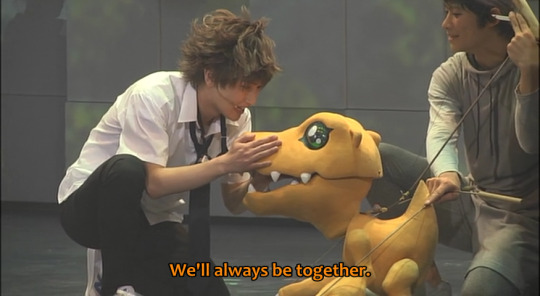
The tri. stage play (full title: "Super Evolution Stage! Digimon Adventure tri. August 1st Adventure") is honestly quite an unusual entry in this franchise, even within Adventure standards. Nearly everything about its production is unusual -- the entire genre it's in is unexpected, the choice of time period to release something like this is unusual, and moreover, now that Kizuna’s out, a lot of people have noticed a lot of suspiciously similar themes and even language, most notably the key “we’ll always be together” line (phrased even exactly the same way in Japanese). In fact, despite ostensibly being a tri.-branded product, other than a few vague token nods to the anime series in the play itself, said stage play has very little to do with the actual anime sharing its name, so the similarity to Kizuna is even more striking in retrospect.
Perhaps another interesting thing about this play is that it’s a very good example of a standout work in the Adventure universe that didn’t have any original creator involvement (other than some minor tips from Seki). I think there’s often a tendency for people to think that in order for a sequel or spinoff to be true to the original, it has to have some member of original staff on there, especially since the Adventure (and 02) characters tend to be a bit overly complex and it helps to have the reassurance that someone who knows them is behind the wheel -- Kizuna used the presence of Seki and Yamatoya as an outright advertising point -- but this stage play’s director and writer had no experience with the franchise beforehand, not even as a fan, yet still made a very respectful product that has generally been received well by Adventure (and 02) fans and even got the original director’s approval, too. If anything, that makes it all the more impressive!
(Note that the below text spoils the story content of the play, but not Kizuna’s to any substantial degree.)
Some production background
Anime and video game stage tie-ins are fairly common -- much like this one, they tend to have very short runs and are targeted at a limited audience -- but they’re usually stereotyped as being for the otome crowd (i.e. predominantly female otaku audience), so works like this are generally associated with it. As a result, when this play was announced and released between tri. Parts 4 and 5, quite a few people were surprised, because this franchise originally came from products associated with shounen anime. In practice, this was a period where it was becoming increasingly clear that there was, in fact, a huge female audience for Digimon (especially Adventure universe), on top of the fact that (as noted by the performers in the final show) the audience for this show ended up being unusually mixed-gender, because Digimon really is universal -- but it did lead to the announcement of the play being initially received with heavy skepticism, partially because of the usual misogyny (stigma around things associated with female audiences, etc.), and partially because this was during a time where...well, saying that a very huge percentage of the fanbase, especially the Japanese side, was really pissed off at anything tri.-branded at the time is kind of an understatement. Ultimately, the play ended up very well-received with a small but dedicated following, and it’s currently referred to as “dejisute” (short for “Digimon Stage”) in Japanese fan shorthand. Bringing it up generally elicits positive critical feedback, even among those who were initially skeptical.
Some interesting things also surround the circumstances of its production as well. As some might know already, the tri. anime series and Kizuna share only one key member of staff: Kinoshita Yousuke, who was involved in tri. Parts 5 and 6, and eventually went on to become the producer for Kizuna and the upcoming 02-based movie. tri. was a work that (for some reason) had a huge number of producers on it, of which Kinoshita was only one; he seemed to have been replacing Arai Shuuhei, who left the project after Part 4. However, while Arai was formerly one of the most visible of tri.’s producers (he was the only one regularly brought up in interviews), how much degree of influence Kinoshita had with tri. is unknown, other than the fact he had no involvement in its story. Given that the decision to make Kizuna also seemed to have been made around Part 5, it seems that Kinoshita may have been brought on specifically for the purpose of observing and prepping for Kizuna, because his role on tri. seems to have been so minimal that the moment he was put in charge of Kizuna, the production philosophy ended up becoming completely different under his management. (When you think about it, tri. and Kizuna have very little in common, other than the rough premises of involving the older Adventure cast.)
The thing is, though, Part 5 isn’t actually the first tri. work Kinoshita is credited for, but this stage play is -- which is interesting to consider when taking into account the heavy amount of thematic parallels between this and Kizuna three years later, and in general the very unusual creative decision to make a stage play that suddenly popped up at exactly this time, making heavier tributes to Adventure (and even 02) than the actual anime it was branded with. Making things even more interesting was that the stage play’s director and writer, Tani Kenichi, was allegedly recruited by an unnamed producer impressed with his work (by the way, did I mention Kinoshita used to work in live-action before joining Toei?). Given all that, perhaps this stage play coming off unnervingly like a sort of Kizuna prototype isn’t all that surprising...
Unfortunately, right now we’re still kind of in a time period where official will get barraged with violently angry comments for even so much as putting the series on streaming services, so it’ll probably be a few more years (if ever) before official will be willing to be more open about what went on behind tri. production, and it’s probably a bit much to get too speculative about things like this when real people are involved. Nevertheless, one thing is apparent: the director and writer, Tani, was a newcomer to Digimon -- not even someone who’d been a fan beforehand -- but watched all of Adventure and 02 in preparation for it and stated openly that he was very, very emotionally touched by it. The work itself is obviously made with a lot of love and respect for the series, and one really cool thing about it is that you can also tell that it came from the perspective of an adult with no preconceived notions about it, therefore meaning it comes from someone analyzing the series without necessarily caving to fanbase mantras, and making some very cogent observations about the characters. It’s also just a fabulous work production-wise in general -- the puppet work and making the Digimon look convincing on stage is very well-done, especially when you consider that this play had only ten showings -- and you really gotta appreciate the fact that, even before Seki gave him a few pointers, he was so passionate about the importance of Digimon partners that he pushed for all eight to be represented despite the expenses.
Taking a look at the play itself
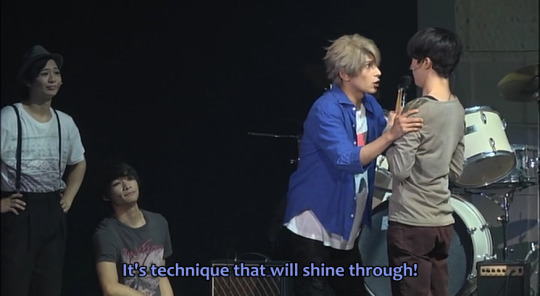
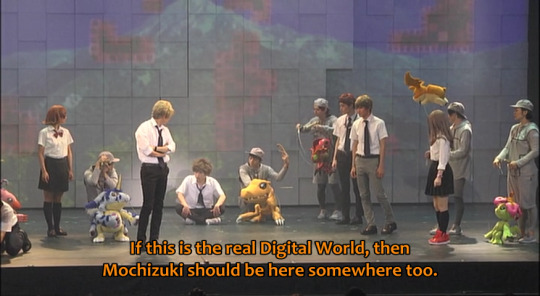
Despite ostensibly tying into the tri. anime series it's branded with, the play only really seems to loosely refer to some of its key elements as taking place at approximately the same time, such as Koushirou’s server, infected Digimon, setpieces like KNIFE OF DAY, and an eventual “reveal” that this seems to take place ostensibly around the rough time period of tri.’s Part 4. Look closely, however, and you’ll notice that a lot of things in the characterization and plot arena actually don’t track much with tri. at all -- for instance, in a very non-comprehensive list of things:
It’s implied that Yamato himself is embarrassed about the KNIFE OF DAY band name and is desperately trying to get through it with passion, which doesn’t quite line up with his attitude about it in the anime.
The timeline just really doesn’t line up; Mochizuki Meiko, Meicoomon, and the infections obviously exist, but you can’t have a time period in Part 4 where the kids recognize Meicoomon as being related to the distortions or infections while also being separated from Meiko. Moreover, the “reboot” just doesn’t seem to have happened at all (and to be fair, if you’re planning on making a two-hour tribute to Adventure, not having the Digimon with memories of said adventure would seriously limit the scope of your plot, so this kind of “leeway” was probably downright necessary).
The tri. anime series portrayed Takeru as having a very sharp shift in language, presumably under the implication he’s putting up a front as a flirtatious, aggressive playboy, and so his first-person pronoun was turned into the aggressive ore and his way of referring to Yamato aniki. In Adventure and 02, Takeru had used the polite boku and childish/cutesy onii-chan, and the boku was prominently used as a plot point to hint at Takeru’s identity as the series narrator. (Yes, these kinds of things are actually kind of a big deal in fiction.) Since even longtime fans generally agree that at some point Takeru would be likely to stop using onii-chan once he became old enough, the stage play likewise also prefers aniki over onii-chan, but, notably, it doesn’t even bother with ore in the slightest nor any of the implications that surround it, and Takeru comfortably uses boku for the entirety of the play. Considering that the use of aniki is still a bit unusual (both Diablomon Strikes Back and Kizuna prominently favor the slightly more polite nii-san instead), it seems that the play was made with an awareness that both aspects of Takeru’s language had changed, but a conscious decision to hold over only one from the anime.
And so on and so forth.
In general, the way you could describe this play’s handling of Adventure universe lore and characterization elements is that it’s a bit selective about which tri.-related elements it makes use of, particularly in regards to ones that might be too difficult to reconcile with the original Adventure (and 02). (This is basically the same attitude Kizuna roughly takes in regards to handling of tri. elements, although it’s less noticeable there partially because of the five-year gap between tri. and Kizuna.) Obviously, being completely incongruous with the tri. anime would be a pretty crude thing to do for a play that’s actually branded with it (and especially when said anime was still ongoing at the time, regardless of public opinion), but, regardless, the end result is that its actual relationship with the tri. anime’s version of canon is a bit tenuous.
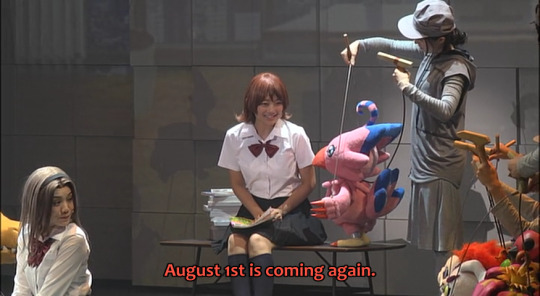
The main reason for this is probably that, on the flip side, the stage play's references to Adventure -- as in, the specific series that aired in 1999-2000 and took place in the in-universe August 1 and 3, 1999 -- are incredibly aggressive. In fact, it’s actually far more aggressive in this respect than Kizuna is. For all Kizuna is branded as an Adventure movie and puts the original Adventure cast first and foremost in all of the advertising, if you watch the actual movie, in practice, it’s more of something that lies in the gap between Adventure and 02 and the two series together as a whole. Adventure was a series that practically revolved around a "trapped in another world" story and the specific impact its events had on the kids involved, but Kizuna focuses more on the “larger world”, including real world society (very much 02 things), with a lot of themes with suspicious pertinence to 02 and references to its epilogue looming over the plot; the specific Adventure references and even the Digital World don’t come into play until the climax. (And that’s before we get into the fact that the 02 quartet gets more screentime than a good chunk of their seniors.) Really, you can see it just by the fact that a majority of the primary key visuals line the 02 quartet up with everyone else; it’s a movie about both, not just Adventure.
So in other words, Kizuna is really about mixing Adventure and 02 elements, serving as a sort of stopgap work, and recasting the Adventure group in a lot of 02′s context. (And that’s by no means a bad thing; since Adventure wasn’t about that, the differing juxtaposition is a fresh perspective in its own way.) But in terms of revisiting what the actual series called Digimon Adventure was and how those events might have an influence on its relevant cast years later, this play (which actually has longer runtime than Kizuna, being around two hours) is a good place to go to if that’s what you’re looking for. The entire premise of the play revolves around copiously referencing that specific adventure back in 1999, and, more importantly, what impact it’s still continuing to have in this particular group’s memories, to the point where they’re starting to romanticize it and wish they could return to it forever...
Ah, right, that’s what this play has in common with Kizuna: the overall theme of unhealthy fixation on rose-colored nostalgia, and the need to move forward from it. (And, driving it home, “unhealthy fixation on the events of Adventure” as a symbol of that rose-colored nostalgia, to boot.)
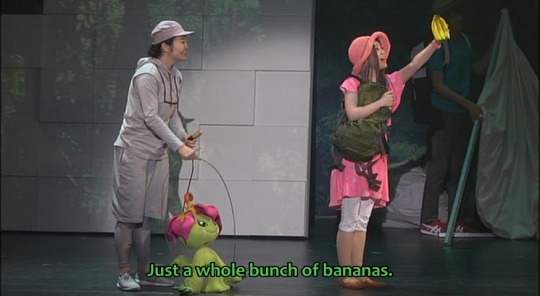
The premise of the play itself is that the kids decide to hold a camping trip as tribute to the adventure in 1999, as part of a desire to "go back to those times" (and, as is eventually revealed, it’s actually part of a pocket universe their subconscious wishes had dreamed up as a desire to recreate the past, thanks to the power of the Digital World). So all of the references to Adventure are concrete and fleshed out in specific detail, ranging from everyone referencing specific events and how they impacted them (Jou very explicitly refers to his experiences in Adventure episodes 46-47 in terms of why it fuels his current desire to become a doctor) to even the most minor of references (direct reference to bananas on File Island, from Adventure episode 3).
As a brief aside, a positive side effect of centering the plot on this specific adventure is that it justifies the reason for why these eight are working together (at least prior to the endgame reveal that they’re still involved in tri.’s events); the eight of them weren’t portrayed as liable to do so without good reason, and while certain aspects and events from 02 are alluded to when they’re relevant, the absence of the actual quartet passing without note is completely justifiable because they simply were not on that adventure anyway. (They weren’t initially planned to be at the event in 02 episode 17, and knowing them, it’s likely they wouldn’t want to be at this kind of outright commemorative camping event, because they’d feel like they’d be intrusive in something they had nothing to do with.) So within the scope of the play in two hours, the narrative can be very neatly condensed to be mostly about Adventure itself.
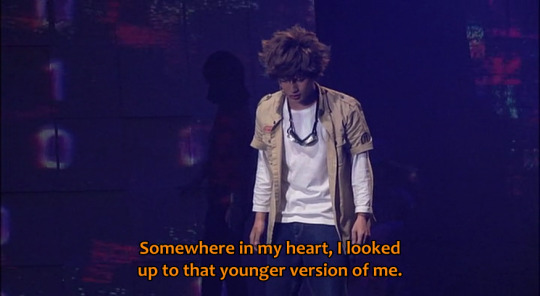
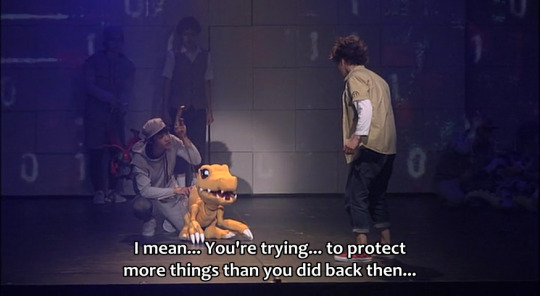
Although this play and Kizuna both share the common theme of the existential crisis that comes with getting older and the tendency to romanticize one’s childhood, the underlying reasons are a bit different; Kizuna’s is very close to 02 in that it’s largely to do with societal pressures and expectations, especially since the question of "what you want to do with your career" is a driving motivation in it. In other words, the existential crisis comes from living up to other people’s expectations, or trying to fit into an arbitrary societal mold of an “adult” without necessarily knowing if that’s what you really want. In the case of this stage play, being set in everyone’s high school years where everyone’s relationship to “the world at large” is a bit more tenuous, the reason for the existential crisis is somewhat closer to Adventure’s: everyone’s started to think they might have been better people back then. More confident, less hesitant, more honest with their feelings. Adventure was a series about self-improvement and one’s relationship with oneself, so it’s understandable that a work meant to look back on that specific adventure will ask the question “well, did they become better people after all?” as a result.
But there’s two problems with this line of thinking: one, this is a very rose-colored evaluation of their former selves, because just because they might have been “more confident” back then doesn’t mean they didn’t have other problems going on (Hikari calls her past self out for being arguably “more honest”, but also somewhat of a dependent child), and two, being more hesitant doesn’t make one a weaker person, just one who’s dealing with a lot more problems and awareness and things to worry about because of how much the scope of their lives has increased. As Agumon says at the end, the old Taichi and the current Taichi are still the same person; it’s just that he’s dealing with more, so he’ll naturally worry about more, and taking on those extra burdens is actually his own way of “evolving”.
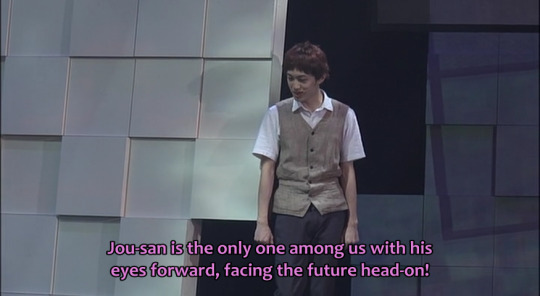
Particularly interesting is the position of Jou, the not-so-unsung hero of this story, who is explicitly identified as the person most clearly aware of his future dreams and proceeding without hesitation towards them, to the point of being somewhat immune to the effects of the dream world. (Somewhat, mainly because the ending establishes that he wasn’t entirely.) It's consistent in line with the fact that we actually saw, directly, the train of thought that led to his decision to become a doctor back in Adventure, and he even states it directly in this play himself: he doesn’t consider himself someone who wants to solve things through fighting, but rather someone who can prevent casualties and heal the injured if he pursues this line of study, and thus is determined to make it happen. Even from the very early points of the play, there are several hints at him being able to see a metaphorical “future” that the others cannot, and while he remains unfailingly loyal to his friends (there’s a long sequence of him constantly claiming he’ll leave them as per Koushirou’s request but constantly coming back because he just can’t bring himself to abandon them), he also is the first one to depart the camping trip to attend to a test -- that is to say, he treasures his past, but he has a strong enough dream for his future that he’s willing to move on better than the others can.
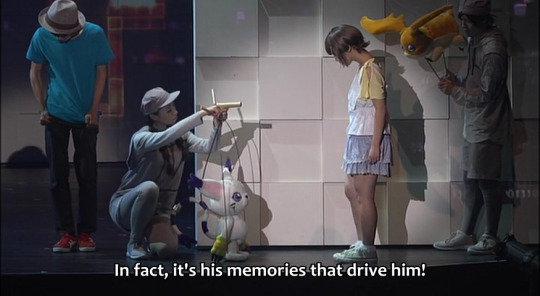
Jou’s also the one to personally advise Yamato about the difference in nuance between doing things because you feel you must, versus doing it because you yourself truly want to, a difference in nuance that also becomes very pertinent in Kizuna. Also pertinent to both works in common is the discussion of nuances between “staying trapped in one’s memories” and “violently cutting them all away” (the consequences of the latter being more extensively discussed in Kizuna), versus the ideal situation of reflecting on those memories and experiences from the past in order to productively move forward.
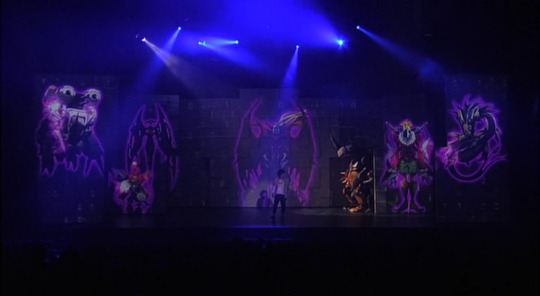
And in the end, rose-colored nostalgia is, indeed, rose-colored nostalgia. Because, sure, that adventure back in the day was great, and they grew a lot, but they also grew a lot because they were overcoming some very harsh, difficult troubles; omitting those parts is losing the substance. The re-invocation of the fun “camping trip” also means re-invoking all of the other things that came along with it, including all of the dangerous threats they’d faced back then. It’s a package deal, and you can’t just filter those out, because it misses the point of what you gained out of it in the first place.
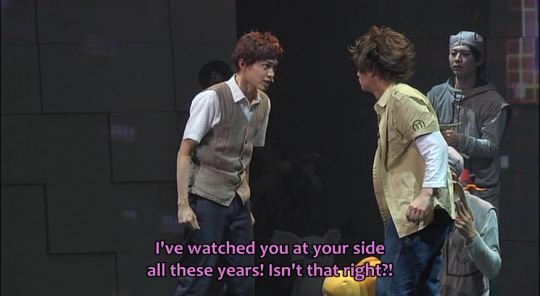
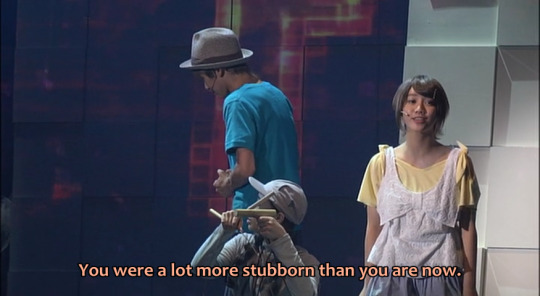
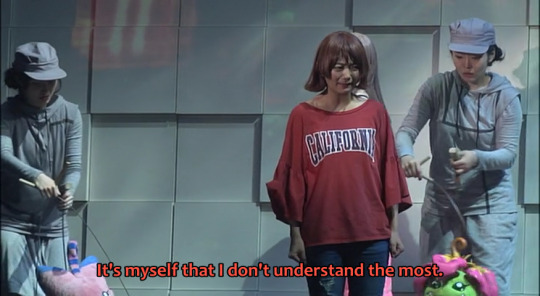
In general, the character writing for this play is also very good; there are some differences between the characters here and them back in 02, but they’re all within the believable scope of positive progression within three years and general adherence to core tenets of their character (Koushirou is certainly more assertive, but emphasis continues to be placed on his deference to others, penchant for spotting details, and capability for being an organizational leader in his own sense). Also notably, this play manages to verbalize a lot of the subtleties in Adventure and 02 that the mainstream tends to gloss over (and don’t tend to get put in official profiles) but are well-known to those deeply familiar with the series. This is the kind of attention to detail usually associated with those who have been studying the series for years, so it’s refreshing to see these come out in words -- for instance, Koushirou stating outright that he was one of the closest people to Taichi for a long time (very true!), Hikari and Takeru actually commenting on each other from back in Adventure (something we never really got in 02, despite “them having known each other for a while” being part of their character arcs), and Sora explicitly admitting that she goes out of her way for others because it’s easier to work for others than it is to even think about herself.
Actually, the attention to detail in general is fantastic; other than a minor slip-up (Sora refers to having met Koushirou during the summer camp at the beginning of the play when she’d actually known him prior from the soccer club, a detail that’s very easy to miss because it’s only mentioned once in Adventure episode 16 and clarified further in the novels), a lot of things from Adventure and 02 are made use of and framed in very clever context; the choice of Etemon as the enemy for this play is well-placed for both his entertainment value and the fact that, as an enemy personally defeated by MetalGreymon in Adventure episode 20, it makes perfect sense that he would have a grudge against Taichi in particular. (It’s also explicitly mentioned that Hikari and Tailmon never met Etemon in person even once, and that Taichi never actually got to see MetalEtemon, so there’s a lot of attention paid to logistics like that.)
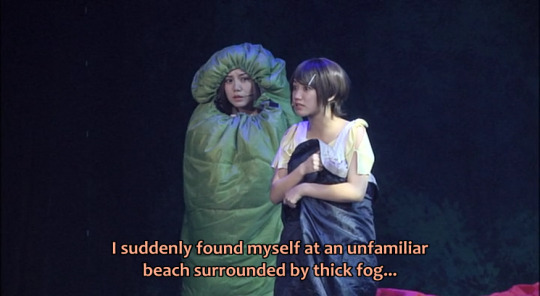
Also, while 02 is not really brought up within the scope of the story (and really shouldn’t be, not when this story so heavily centers around Adventure and its themes), its place in canon and its contributions to the worldbuilding are fully respected; a lot of the offhand references to family situations and background are elements that were originally introduced in 02, and many aspects of its Digital World lore are used to assist the plot premise (in particular, the idea of the Digital World being connected to something that can conjure up unconscious dreams wasn’t explicitly invoked until 02). Rather amusingly, at one point, Hikari uses the events of 02 episode 13 to tell a “scary story” to troll Mimi, and it’s interesting and rather refreshing to see the implication that Hikari’s been able to move past the incident enough to use it to troll someone else. There are also some latent epilogue references as well, with Hikari directly bringing up her goal of becoming a kindergarten teacher, Takeru making some really subtle references to wanting to be a novelist and chronicle their adventures (in true Takeru fashion, he never states it outright, but anyone familiar with the epilogue can figure it out), and Taichi alluding to an ultimate goal of humans coexisting alongside Digimon.
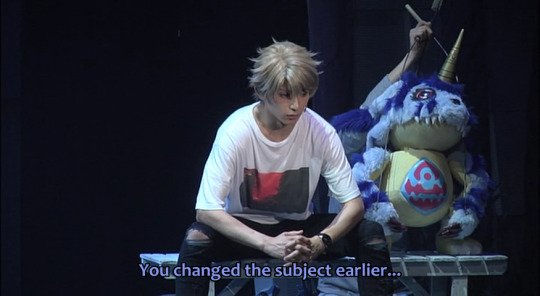
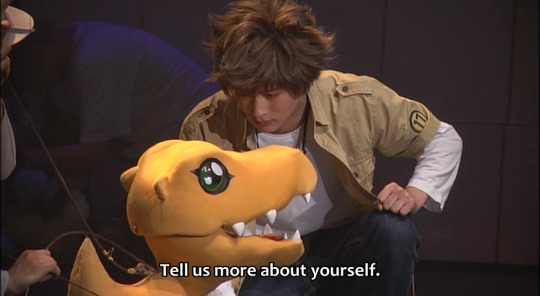
Finally, attention should be called to the play’s relationship writing in general. As stated before, the play does call attention to relationships between characters that often don’t get brought up by the mainstream but are somewhat more well-known to fans -- Koushirou and Taichi, Sora and Mimi, Jou and Yamato -- but even the well-known ones are treated with nuance endemic to that from Adventure and especially 02, given that Taichi and Yamato don’t actually have the stereotypical “cold rivals” atmosphere that shounen anime would usually suggest, and the two of them have an extended heart-to-heart in which Yamato actively tries to figure out what’s wrong with Taichi and treat him kindly. (Like in Adventure, the only time they break out in a fight is when Yamato gets emotionally compromised and starts worrying that Taichi isn’t doing enough for others’ welfare.) It’s also very consistent with how the two treat each other in Kizuna as well (the izakaya scene comes to mind, and has a lot of similarities to the awkward-but-ultimately-close conversation they have at night in this play).
And, of course, the centerpiece of the narrative overall: the human-partner relationship. Of course, a lot of this was probably helped by Seki lecturing Tani to not mess this part up, but it really is impressive to consider in light of the fact we’re working with a lot of puppets that have handlers clearly in plain view, so you have to have some massive suspension of disbelief to make this work. But not only are the movements well-done to make it convincing that you really are seeing these actors physically interacting with their partners on stage, the narrative also puts huge spotlights on them, making the Digimon outright be the ones to snap their partners out of their worst patterns of thinking (especially with Agumon and Taichi), and dedicating a long period of silence where literal stage spotlights are dedicated to each kid having some alone time with their partner. The intimacy is very convincing, and, truly, Tani’s insistence on making sure every single one of the main Digimon was represented in spite of the prohibitive budget paid off very well. The point is made: a Digimon partner has to be someone who knows you well and intimately and can call you out at your worst moments, and Taichi even spells it out: Agumon’s capable of seeing right through him.
Putting it next to Kizuna -- a movie dedicated entirely to examining the meaning of a partner relationship, what happens when it deteriorates, what that means for oneself, and what it takes to recover it again -- it’s perhaps unsurprising that this play ends on the same line that was used in all of Kizuna’s advertising and was central to its own plot: “We’ll always be together.”
68 notes
·
View notes
Text
Sonic may actually be lost royalty
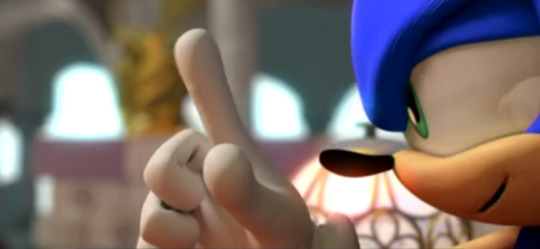
I keep going down these rabbit holes I shouldn’t go down BUT! Although this theory is one that I don’t fully believe in (unlike the infinite/solaris theory and the chaos emerald theory) I still have a good argument that I want to talk about very bad.
I also tried to make this as short as possible but there’s a lot of ground to cover, but at least it’s not the infinite/solaris theory. But I have a TLDR at the end.
[Spoiler Warning for Sonic and the Black Knight]
let’s start with a ✨numbered list✨
1. Blaze the Cat

Blaze is the biggest caveat for this theory, but I think it’s best to start with her.
Now, firstly I need to clear up some things.

[Eggman: My world...]

[Eggman Nega: and my world...]

[Eggmen: are in a manner, inextricably linked!]

[Blaze: Like two Eggmans?]
Part of the Blaze’s world is that it’s a parallel universe. Parallel Eggmen, Parallel emeralds, Everything else that isn’t stated outright. Like how Tails and Marine are definitely counterparts. Seeming as Tails came from South Island and Marine came from southern island, Tails is definitely based on a kitsune and Marine, in theory, based on a tanuki.
And, although not stated completely, Blaze and Sonic are universal counterparts.
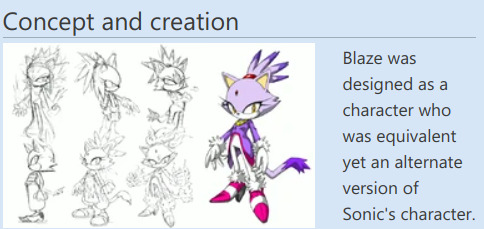
[From Sonic Wiki: Blaze was designed as a charater who was equivalent yet and alternate version of Sonic’s character.]
Much like the Sol and Chaos emeralds, Sonic and Blaze are a mirror version of one another, although slightly different.
Alright, now that we have that out of the way:
Looking at the connections between the others, Sonic and Blaze seem, a bit too different.
The Sol and Chaos emeralds fulfill the same role, although their different appearance, and have a similar story. Tails and Marine fulfill the same role, although their different appearance, and have a similar story. The Eggmen fulfill the same role, although their different appearance, and have a similar story.
Blaze and Sonic fulfill the same role, although their different appearance, and have a... completely different story.
Blaze was born to a royal family, and set to protect the Sol Emeralds and the Jeweled Scepter as her birthright, and it’s somewhat hinted that her powers may also be a birthright. Sonic, on the other hand, has no known past, and seems to have just run into the Chaos Emeralds by accident.
You could claim that Blaze does take on the role of both Sonic AND Knuckles, which is fair and stated on the wiki, however Knuckles is also never stated to be any kind of royalty, and certainly doesn’t have that kind of past, his past being one of the more tragically alone ones.
And here’s something interesting.
Time has warped our vision of Blaze. We all know her as “Princess Blaze the Cat.” But from watching Sonic Rush, her opening game... she is never mentioned to be a princess until the very end.

[Burning Blaze: As princess, it is my duty to protect the Sol Emeralds...]
From what I remember, this is the FIRST mention of her royal status.
From this game’s viewpoint, they reveal the mirror status of the dimensions. They then show both Blaze and Sonic having mirror super transformations using their emeralds, highly implying that Sonic and Blaze were mirror versions. (also this was implied already by just Blaze’s shoes.) and then it’s revealed that Blaze is royal, and a princess.
So if she’s the mirror of Sonic, what does that mean for Sonic? Especially right after showing the two of them being, well, mirrors.
2. King Arthur

SATBK is much less transparent about the counterpart universe thing.
Now this is an alternate universe, set up by Secret Rings, and surprisingly not just a story Sonic told as an elaborate excuse.
They don’t hide obivous Sonic characters being put into roles, and their in these roles for a reason.
Blaze and Silver as Percival and Galahad, the knights who quested together for the holy grail. Knuckles as Gawain literally only because of “Gawain and the Green Knight” But I respect that so much. Jet as Lamorak because of Lamorak’s fiery temper and competitiveness. Shadow as Lancelot because he’s the “closest knight to the king” stated in game (👀) Tails as a Blacksmith because that’s p much the medieval version of a mechanic. Amy as the Lady of the Lake because like. Fuck she’s the most powerful one there. (but seriously, in forces she’s shown to be the most level headed leader and strangest, especially in Sonic’s absence. As well as “sensing” that he was still alive and having a past in tarot.) And Merlina as Merlina because... well that’s a whole other theory.
(all my theories are being brought up in the post. like i know the first two were expamples of theories I fully belive in but damn this is like a avengeners, ok,)
But Sonic as King Arthur makes sense when it’s revealed. Although he wasn’t anyone’s counterpart in Secret Rings (because secrets rings was confused as hell) He is in this game, and as the ring leader of everyone following him in SATBK, it makes sense.
Although something that was never brought up...EVER is the Knight’s backstories, which are EXTREMELY important not only in Arthurian legends, but for the knights in Sonic lore. All of the knight’s mentioned backstories are important to their character, in both contexts. Although their never brought up.
*DEEP BREATH* Alright. The similarities between Sonic Character/Knight backstories.
Shadow and Lancelot have pretty simmilar backstories when getting down to it. Shadow/Lancelot were both raised for greatness, but still outshined by Sonic/Arthur. Although remaining loyal to them, even if for Shadow it’s only in times of need. Shadow doesn’t want to admit he’s a supporting role to Sonic, although Sonic generations kinda throws that Idea out of the water when Shadow cheers Sonic on while watching from the sidelines, much like early Lancelot.
For Blaze and Percival, in multiple interpretations Percival is of noble birth. Upon meeting Sonic’s Gang/The Knights, Blaze/Percival get’s inspired by their heroics and eventually joins them.
“Lancelot and Percival prove morally superior to Gawain who follows the rules of courtliness to the letter rather than the spirit.“ Is an actual quote from Wikipedia. Although it is VERY hard to find a concrete backstory for Gawain other than “separated from his home”, I think this proves enough. As well as the Gawain and the Green Knight story (in which Gawain tries to slay the green knight and then he picks up his head and says “see you in a year” is pretty representative of Knuckles constantly breaking the master emerald in a comedic light.)
Lamorak/Jet are known for challenging Arthur/Sonic to competitions.
Galahad/Silver are searching for an object/person aided by Percival/Blaze
So now that we’re all good, do you see the similarities between part one.
Although everyone else has given backstory similarities, Sonic is given none, seeming as, as far as we know, Sonic HAS no backstory.
But isn’t it interesting that King Arthur’s backstory is being lost royalty? And the secret son of the king? Wack.
3. Sonic Fucking Underground
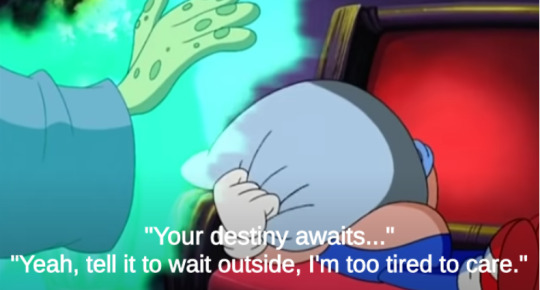
Now, most of you are probably unfamiliar with Sonic Underground. Good.
If you’re not, you watched it as a kid and you’re nostalgic, and let me tell you I watched the entire show recently and it’s not as good as you remember.
But Sonic Underground’s quality and history could be a post on it’s own, it doesn’t matter here. What matters is the plot:

[From Sonic Wiki: Sonic, Sonia, and Manic are the children of Queen Aleena, the rightful ruler of Mobius and are pursued relentlessly by Doctor Robotnik and his bumbling bounty hunters sidekicks, Sleet and Dingo. As infants, the siblings were separated and placed in hiding to fulfill a prophecy made by the Oracle of Delphius (a spoof of the Oracle of Delphi of Ancient Greece) that the triplets would grow up to find their estranged mother, overthrow Robotnik and take their places once more as Mobius' rightful rulers.]
FORGOTTEN ROYALTY YOU SAY.
Now, Sonic Underground is VERY SEPARATED from Sonic Lore, and nothing has ever taken from it besides Manic appearing in some comics, although from what I know he’s never mentioned to be Sonic’s brother. So This is the part I always take with a grain of salt, however;
4. In conclusion/TLDR
We have Two Instances of Sonic being lost Royalty (One in a separate reality and one in a separate continuity) We have Two Instances of Dimentional Counterparts of Sonic being Royalty (Blaze and King Arthur) We have zero given backstory for Sonic We have Three instances of Sonic, or a counterpart, being royalty
And from what I remember hearing, three’s a pattern.
#sonic the hedgehog#theory#sonic theory#royalty theory#sonic rush#sonic rush adventure#sonic and the black knight#satbk#sonic underground#sonic wiki#Not only is this a deep dive into sonic#but I accidentally did a meta abput the satbk round table and their simmilarites to the og knights
351 notes
·
View notes
Text
Season 2 Teaser for The Owl House?
So for those of you who haven’t caught up; A few days ago, Dana released an exclusive photo of herself on Instagram, with a cryptically-blurred reflection in her window that was all too conveniently-placed;

Now, this COULD just be some game she’s playing, but like; Reverse-image searches have yielded nothing, and it hurts no one to speculate! Thanks to @50shades-of-blue, who had the common sense to remember to flip the reflection, we have something more akin to THIS;
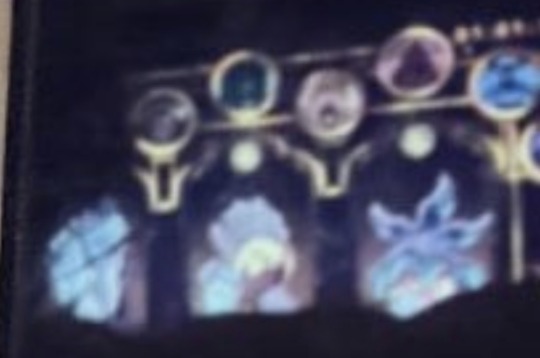
This image bears a decent resemblance to a sequence from the show’s intro, in terms of structuring; We have characters divided and separated by golden bars. This points to Dana’s image being a shot from a new intro for Season 2, either one for an entire season, or a single episode. I say this, because looking at the subject matter… On the very left, we see something vaguely blue, and similar in resemblance to a bile sac;
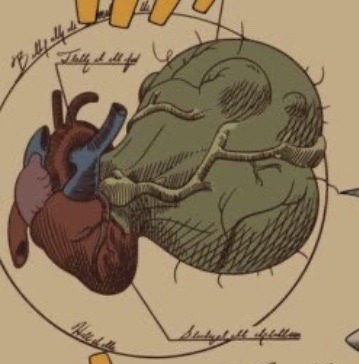
This could actually be the Titan’s heart, image below for reference;
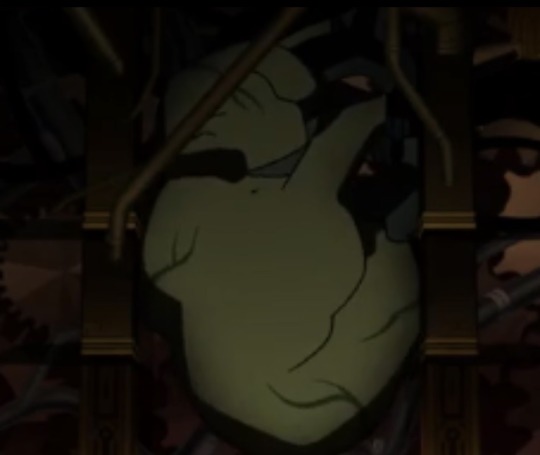
Not only that, but as Blue’s helpful tracing points out, the other two figures in the ‘slots’ bear a resemblance to Owl Mask and Kikimora, the latter having the fingers of her hand-hair splayed out, and the former appearing to take off their mask.

What little we see of Owl Mask bears a decent-enough resemblance to the Season 2 character that Dana teased, further cementing a connection between the two. Not only that, but we get a glimpse of five (possibly six) colorful symbols above the three character slots, each likely pertaining to the Coven Heads, as shown by Blue’s earlier tracing.
In particular, you can tell the blue symbol has the same distinctive, U-shaped horns of the Healing Head; And the green symbol bears enough resemblance to the Plant Head, with their dark-green bangs covering most of their lighter-green face. Combined with symbols that seem similar to the Construction, Beastkeeping, and Oracle Heads, the exact layout we’ve seen so far coincidentally seems to match the banner layout seen in The First Day;

You have from left to right; The Construction, Plant, Beastkeeping, Bard, and Healing Heads! Now, if you look to the very right of the image, there also seems to be a sixth symbol, a bit lower than the others, with what appears to be a purple coloration; This is likely the Oracle Head, especially since it matches with the aforementioned placement of the banners. Now, exact positioning beside, we also know that there are three more symbols obscured, the ones for the Abominations, Potions, and Illusion Heads. If we go by the pattern established by the rest of the image, with the Heads at either end of the display being placed lower than the rest, and the rest being shown in an up-down pattern… Then it seems we more or less have the vast majority of this mysterious screenshot, with some of it blacked out!
As others such as @preciseprose have suggested, there’s a good chance that this is a screen transition, hence why only a specific corner and portion is obscured; Because if this shot parallels the one seen in the Season 1 intro with Willow, Gus, and Amity, which burns away in the middle to reveal King… Then it makes sense that a similar transition would happen with this show, perhaps obscuring from the outside-in this time as a contrast.
Now, what’s interesting is that this style of shot, once reserved for protagonists and friends/peers of Luz, is now being designated towards lesser-known antagonists associated with the Emperor’s Coven. While this could just be how the Season 2 intro works, with Gus, Willow, and Amity appearing later or earlier, likely closer to Luz; It does make me and others wonder if we’ll get a dedicated intro to the Emperor’s Coven with Belos, front-and-center! I’ve talked at enormous length in the past of Luz and Belos being parallels… And it’d match other Disney TVA shows, such as Gravity Falls, Ducktales, or Amphibia, who had villainous takeovers for their shows’ intros as well!
This could of course allude to an episode with a heavy focus on the members of the Coven System, specifically Belos and his aides Owl Mask and Kikimora, as well as the Head witches of the Covens he appointed and presumably trusts. This is of course all fascinating and has me even MORE intrigued, but also; The placement of the Titan’s heart alongside Owl Mask and Kikimora suggests its treatment as its own character as well… Which, if it’s a giant heart, it presumably represents and operates as a stand-in for the Titan, perhaps the conduit with which Belos even speaks to it (and vice-versa?) through! AKA the Heart represents the Titan, it IS the Titan, which then suggests that this Emperor’s Coven triumvirate consists of the Titan, Owl Mask, and Kikimora…
But that’s not the only consideration! I’ve talked before about character parallels in this show… We have Luz and Amity, Eda and Lilith, Owlbert and Lilith’s palisman. I’ve speculated on King and Kikimora being parallels, and even Hooty and Belos… But that always made me wonder; What about Willow and Gus? Do THEY have parallels, associated with the Coven System and its Emperor? And for a while I entertained Warden Wrath and Owl Mask, but lo and behold; I may be right, at least about one of those two, and also in general about parallels! Because if we compare the placements… We have the Titan and Willow, Owl Mask and Gus, and Amity and Kikimora!
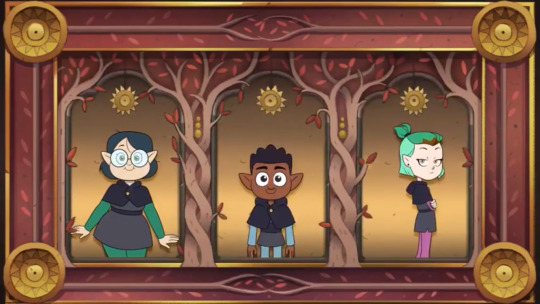
Owl Mask being a parallel to Gus is interesting, because they’re operating as a spy for Belos; And presumably, Illusionists would be great at stealth. I wouldn’t be surprised if Owl Mask used Illusions, albeit to disguise and mask their own presence; A parallel and contrast to Gus, who uses Illusions to create and draw attention and spectacle! Not only that, but it makes me wonder if Owl Mask is also a child prodigy like Gus, if they have issues with being overlooked, and as a contrast to Gus, they’ve embraced this instead of fighting against it…? And Owl Mask is sent to spy on Luz the human, perhaps a parallel to Gus’ own fascination with humans…?
Then we’ve got Willow and the Titan’s heart. Now, this one interests me… And it makes me think about how Willow is presented with a raw, innate strength, and an uncanny ability to cast magic without summoning a circle nor glyph. I’ve talked before about Willow and Belos having parallels, as they both have distinct shots with their eyes glow green; Could this parallel stem more from a connection to the Titan, than anything else? Then as @aguigenae suggested, instead of Luz (or JUST Luz) being able to speak to the Titan… What if it was Willow? It’d re-contextualize her ability to draw onto raw, magical potential through pure emotions… And similarly, a lot of her spells draw power from the Isles itself in the form of plants, and we know the Isles as synonymous with the Titan!
With how Belos seems to draw power and spells from the Isles, albeit with fleshy and stone formations… Perhaps Willow serves as a parallel and foil, creating constructs from the Isles as well, but in the form of plantlife! Her being able to speak to plants might provide a medium to contact the Isles they’re rooted in… And as I said before, Willow has shown an unusual ability with magic not unlike how Belos can cast magic, but through his unique form of spheres and orbs. If Willow is associated with the Titan’s heart, perhaps she could speak to it in a way that Belos can’t- Perhaps they BOTH can speak, and this will lead to a conflict with Belos, who seeks to preserve this ‘privilege’? Keep in mind that it’s Willow who openly defies Belos the most by rallying an entire crowd against him- If she’s the face of the revolution, her being able to speak to the Titan could create further parallels and odds between the two!
Not only that, but… Talking again of Willow and the Titan’s Heart, if the two are parallels; What does this say about the Titan itself? Perhaps like Willow, it’s a being with raw magical power, easily terrifying, and with a connection to nature (as it IS nature in its case). If these characters are dark parallels, then what if the Titan was like Inner Willow, wrathful and fully exploring its dangerous power, having felt harmed and hurt, twisted…
But what if it was also a Willow who never learned to stand up for herself? A powerful, dangerous witch… But with no true self-esteem, no believe in themselves? What if the Titan was like a Dark Willow, and this self-doubt was what allowed Belos to manipulate it? I’ve speculated before that perhaps Belos has managed to sway and influence the Titan into seeing his way as the right way to handle magic… If it was a dark parallel to Willow, perhaps the Titan is hopeless, thinking there’s nothing it can do to oppose Belos, feeling like it’s smarter than him, as a toxic friend with control; Think Anne and Sasha from Amphibia!
We might even get a scene paralleling Willow and Amity’s first appearance, with how Amity condescendingly mocks Willow, albeit with potential, if misguided, good intentions. Perhaps Belos is like this- He’s cruel and manipulative of the Titan, but he also genuinely believes in what he’s doing, that this IS the best for the Isles, and that this is how the Titan should have its magic be utilized and taught. But, in absence of Amity, we see Willow’s true feelings of resentment and anger that have bottled up… So what if the Titan was like that with Belos, except dialed up? What if the Titan hates Belos or wants to see him defeated, but isn’t entirely sure if he’s wrong, either…
So to get into blind speculation, what if- What if the Titan has tried to create a new champion? By going behind Belos’ back and communicating with a new, younger witch, perhaps one that reminds it of Belos before he turned corrupt… What if the Titan is contacting Luz and/or Willow? Hoping to find someone else who will actually speak for them, not just talk over as Belos possibly is doing? Maybe the Titan is trying to foster a new witch, an alternative champion to depose Belos or take over; Or have Belos and Luz/Willow compete, to prove to the Titan who has the best philosophy to magic through their own respective victories?
And if Belos were to find out… Well, I imagine he might do something drastic to the Titan. He has control and access to its heart- Could he torture it in retaliation, perhaps causing quakes across the Isles that echo the Titan’s throes of agony? Would Belos do something drastic to prevent the Titan from helping Luz/Willow, adversely affecting the Boiling Isles in the process? Similarly, if Belos is a toxic friend to the Titan, perhaps there’s symbolism to his castle built around the Titan’s heart… Kudos to @fermented-writers-block for some of these ideas;
Perhaps it could be interpreted as Belos having an iron grip over its heart, or the Titan building up walls around its heart –thanks to Belos’ encouragement- and letting in only Belos…? Alas, Belos is the one who convinces the Titan to hide itself away and let only him in, because only HE cares, only he knows best… And yet, he’s the one who helped build those walls that the Titan hides within. Ultimately, his castle MUST fall- Especially if it’s being used to exploit and manipulate the Titan’s heart in other, literal ways as well…
Finally, let’s talk Amity and Kikimora sharing placements. There is of course the obvious implication of romantic feelings, but also… What if, instead, there was this idea of Belos being like Luz to Amity, for Kiki? For Amity, Luz was an outsider who came out of nowhere and changed her life for the better, helped her stand up for herself- What if Belos was that to Kikimora? What if he was an outsider, a human even (before he changed and decayed) that changed Kikimora’s life forever after he appeared from nowhere… The two starting to a prickly start, before truly caring for each other? As Belos encouraged Kikimora to stand up for herself, eventually culminating in her own life improving(?) as Kiki is now second only to him, the Emperor of the Boiling Isles! It might explain why he seems to trust her so much- The two genuinely care for each other and Kikimora feels like she owes everything to him…
And, to incorporate my own analysis/speculation of Amity; Perhaps Kikimora has placed all of her sense of self-worth into Belos, about how she can help him, because only HE ever made her feel like something! What if as a toxic parallel to Luz and Amity, Kikimora has lowkey become dependent upon Belos- Who, while kind to Kikimora… Kiki still has placed all of her self-esteem not in herself, but in Belos’ approval of her. And while Belos DOES approve and provide support, it’s still dangerously dependent and shows that Kikimora can’t really stand for herself, that she needs someone else as a litmus test to judge her worth as a person.
Finally, we know Amity is the least talented compared to Willow and Gus; Given how we have the literal Titan and Owl Mask, compared to Kikimora, who caves into Luz’s threats… It’s possible Kikimora is the least powerful amongst the Titan and Owl Mask, but has made up for it with raw determination and skill? After all, she presumably cast the magical cage that all of Luz’s efforts wouldn’t have been able to defeat. Perhaps like Amity, Kikimora had to work hard to prove herself, to earn respect; And like Amity in Episode 3, Kikimora feels a desperate need to hold onto that sense of accomplishment and superiority, and can and WILL retaliate viciously when it’s threatened. To Kikimora, she’s dedicated everything into making up for her own shortcomings, just like Amity- So she despises cheaters, or at least people who undermine that work.
(I know what some may be thinking- Isn’t Kikimora a King parallel? Well, these parallels work in multiple ways… Amity parallels Luz, but then so too does Belos, presumably. I wouldn’t be surprised if Amity was both a parallel to Luz AND Kikimora, then.)
And, that’s my general thoughts, analysis, and speculation, all based from this reflection we’ve seen! It’s possible Dana is trolling us, by accident or otherwise, with a videogame screenshot… But hey- It doesn’t hurt anyone if we’re wrong, I say! It’s all in good fun… Besides, if it WAS a teaser from Season 2, and we didn’t give our shot, then we’d all feel like idiots! We may as well take our chance and analyze, because- Just in case…!
#the owl house#the owl house luz#Luz noceda#the owl house belos#emperor belos#the owl house willow#willow park#the owl house gus#augustus porter#the owl house amity#amity blight#the owl house kikimora#the owl house season 2#speculation#theory#analysis#Dana terrace
187 notes
·
View notes
Note
How about 3, 17, and 24 for the writer asks?
Hey, thank you so much for the great asks, these were headscratchers in a very interesting way!
3. How would you describe your writing style?

But beyond this first instinct, I think I'd describe it as... introspective??? maybe??? I'm bad at writing movements and I apologize.
What I can say is that it's very literary-inspired, especially by the specific sub-genre of woman-driven character studies (so Helen Oyeyemi, Emily Friedlund, Emma Cline, Akwaeke Emezi, Lauren Groff to a smaller extent...): lots of weird verbiage, metaphors, comparaisons and parallelisms all around. I love sentences that are compelling, beautiful and revelatory: if I can nail one like this every once and a while, I'm very happy.
I also had to admit to myself that my writing style has a lot of spiritual ties to the realism movement of the 19th century in France, especially Gustave Flaubert, which 17 years old me would have loathed me for. I am driven by similar concerns, for example the immensity of romanticism having to cram itself into the claustrophobic constraints of reality, and my obsession for subtext as well as my love for tragi-comic situations do come from somewhere.
I am also inspired by every story that really is invested in a place or a group, and gives the reader a glimpse at its truth through flawed and limited perspectives; I'm thinking Jorge Amado, the TV Show The Wire, the game Disco Elysium... Things that try to breach the barrier between the personal and the political.
It is also not illegal to call my writing style flowery (though I will be moderately-to-unfairly grumpy about it since I try to put care and importance on the words I use), but it is true that my primary goal is not always clarity. I do go for depth over accessibility sometimes, which is a choice readers don't have to love and is understandably not everybody's cup of tea.
17. Past or present tense? Why?
It depends on the story! I love both (like I love every point of view pronoun, depends on the story and what it needs)! For some stories, I seek the immediacy of present tense to convey something about the mood, the character's perspective, etc. For others, I love past tense for its distance, its contemplation, sometimes the breath of inevitability it can bring with it.
I am also deadset on writing a short story in future tense at some point. This point of view really intrigues me in what it can do and how far it can be pushed.
24. Thoughts on flashbacks/flashforwards.
Hehehehe.
So I think flashbacks are just a great storytelling tool in general; there's so much meaning that can be brought from the backstory of a character to its fictive present, and regular character introspection can hardly ignore flashbacks given the character has working memories.
Then, I think flashbacks can be pushed super far, become characterization themselves, and then become absolutely unmanageable and eat your very soul. It doesn't have to be, but it can do this, and will do this if you let them.
(I am struggling so hard to figure this part out in TEoP)
I have rarely interacted seriously with flashforwards, but I keep on wondering if they really are that different from flashbacks in principle? I suppose it depends on where the fictive present is located, but if flashforwards are considered as such for retrospective fiction (for example, an old character looking back on their youth and something that happened then), then what's a flashback and what is a flashforward?
Maybe it's because I haven't played with them enough to fully get it, but I have trouble understanding how to truly separate the two given that time is an illusion, especially in fiction.
Thanks again, these were really fun!
(based on the Yet Another Writing Asks!)
3 notes
·
View notes
Text
Post about ST & probably some video games inspo and Me both excited and panicking at the thought of these having inspired this story... 😬
_____________________________
It would take too long to describe all of these stories and how they connect to ST but here are some visual parallels with some interesting quotes from the games for you.
The Outlast Series:
Outlast & Whistleblower DLC
"I know, I-I, I know, I am supposed to be dead. No, no such luck. I am older than sin, but, somehow, the only one left. Because of Billy. He takes care of me. He may think I'm his father. He certainly loves me, the poor idiot."
"He will spread if you don't stop him. The Morphogenic Engine is self-perpetuating. I pray to god you have the strength to end it here with you death."
"You have to stop him, to murder Billy. Turn off his life support, his anesthesia. You have to undo what I've done."

"We achieved something like this in 1944. Those fascists thought it was spirits, and I let them believe it. Let them kill themselves thinking there was some kind of afterlife now empirically promised to them. Fools.
Poor Alan. He would weep to see what I've built from his dreams."
"Billy doesn't mean harm. He's a child with a damaged mind, granted the powers of a God. It would make any of us into a monster."
Outlast II
"In search of the origins of murder victim Jane Doe."
"Papa always liked me best, Papa always liked me best."

"Catamite to the devil."
"It's cold."
"I was dreaming about Jessica Gray. From when we were kids."
_____________________________
The Last Of Us Series:
The Last Of Us & Left Behind DLC
"Lucky? No, no... No such thing as luck. No you see I believe that everything happens for a reason."
("-Here. You should eat. I know you're hungry -- been out for quite some time."
-What is it?
-It's deer.
-With some human helping on the side?
-No. No, I promise. It's... just the deer meat.)


"Run little rabbit; run."
"My vote. Let's just wait it out. You know, we can...be all poetic and just lose our minds together."
_____________________________
Silent Hill Series:
Silent Hills/P.T (Playable Teaser)
"I walked. I could do nothing but walk. And then, I saw me walking in front of myself. But it wasn't really me.
Watch out. The gap in the door... it's a separate reality.
The only me is me. Are you sure the only you is you?"

"As the Congressional Debate over gun control flares up yet again, we regret to report the murder of the wife and her two children by their husband and father."
"(It was a cold hand, body was trembling.)"
"Dad was such a drag. Every day he'd eat the same kind of food, dress the same, sit in front of the same kind of games... Yeah, he was just that kind of guy. But then one day, he goes and kills us all!"
_____________________________
The Souls Series:
Bloodborne & The Old Hunters DLC
"The twins grew up alongside a poisonous snake, and developed a silent, inhuman kinship. The poisonous snake grew uncontrollably, raised on a healthy diet of beast entrails. Even after their deaths, it is said to respond to the call of the twins' whistle from within the Nightmare."
"Ah, sweet child of Kos, returned to the ocean. A bottomless curse, a bottomless sea. Accepting of all that there is, and can be."
"This town is cursed. Whatever your reasons might be, you should plan a swift exit. Whatever can be gained from this place, it will do more harm than good."

"Oh, don't you worry. Whatever happens...you may think it all a mere bad dream."
Me right now:

And I spared all of you of the possible Byler angst inspo for S4 and beyond in Left Behind. It's just the tip of the iceberg.
Here is a post about the parallels between Ellie and Riley & Mike & Will. Especially the "Crazy Together"/"Loose Our Minds Together" parallels.
#stranger things#st4#stranger things 4#el hopper#el byers#will byers#mike wheeler#willel#byler#byeler#jonathan byers#billy hargrove#jane hopper#jane byers#martin brenner#lonnie byers#the demogorgon#the mind flayer#will the wise#did theory#the upside down#will byers is gay#mike wheeler is gay#max mayfield#joyce byers#jim hopper#sara hopper#hawkins national laboratory#hawkins indiana#the hellfire club
23 notes
·
View notes